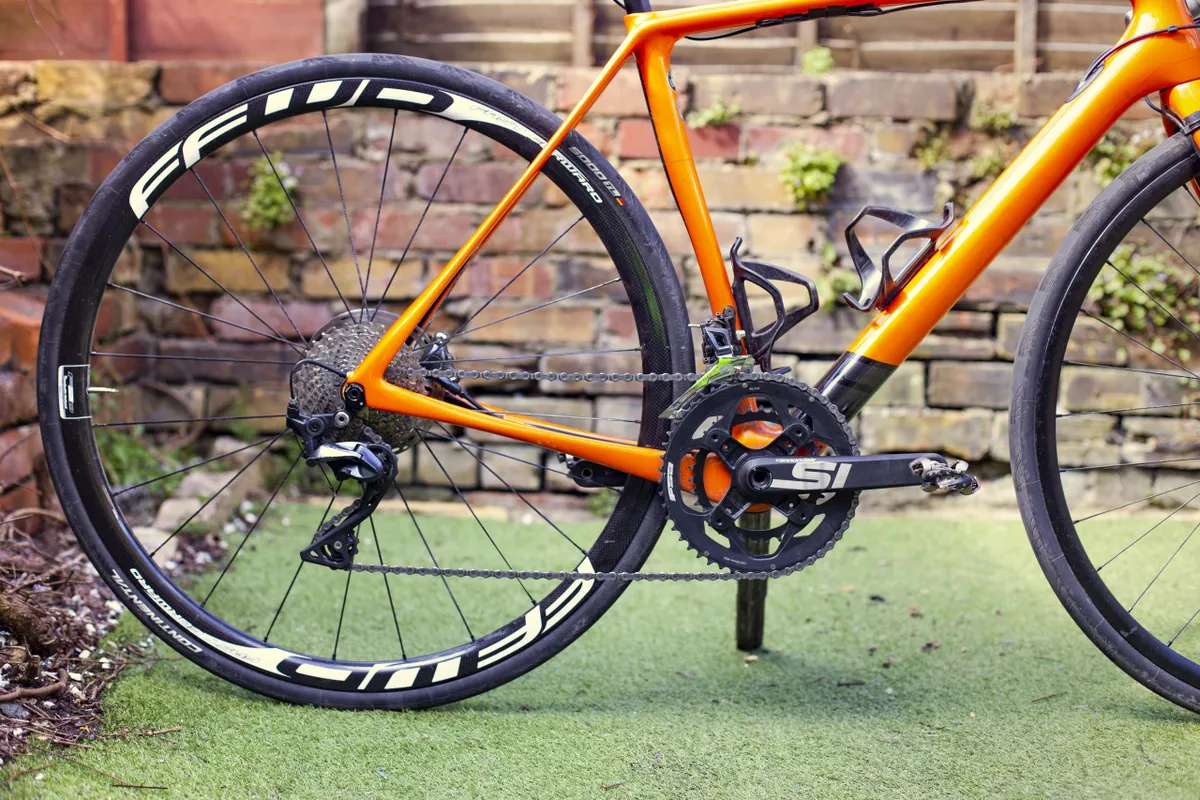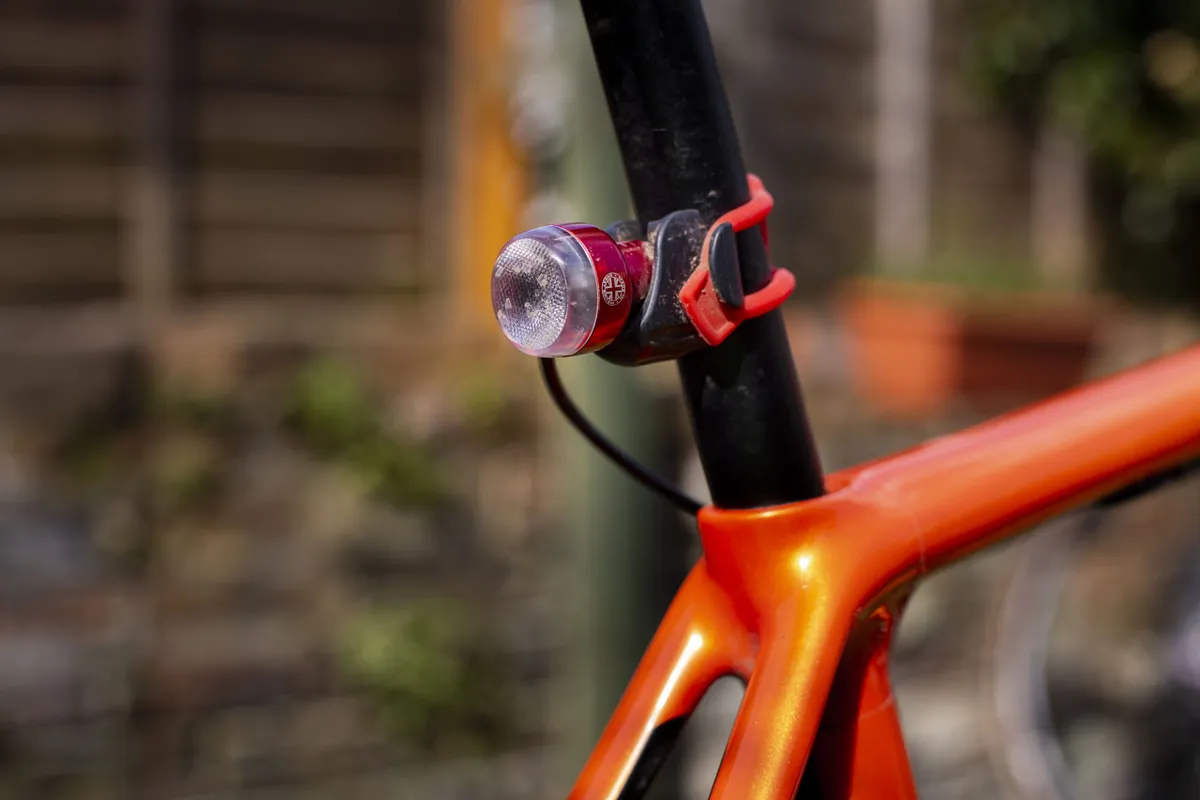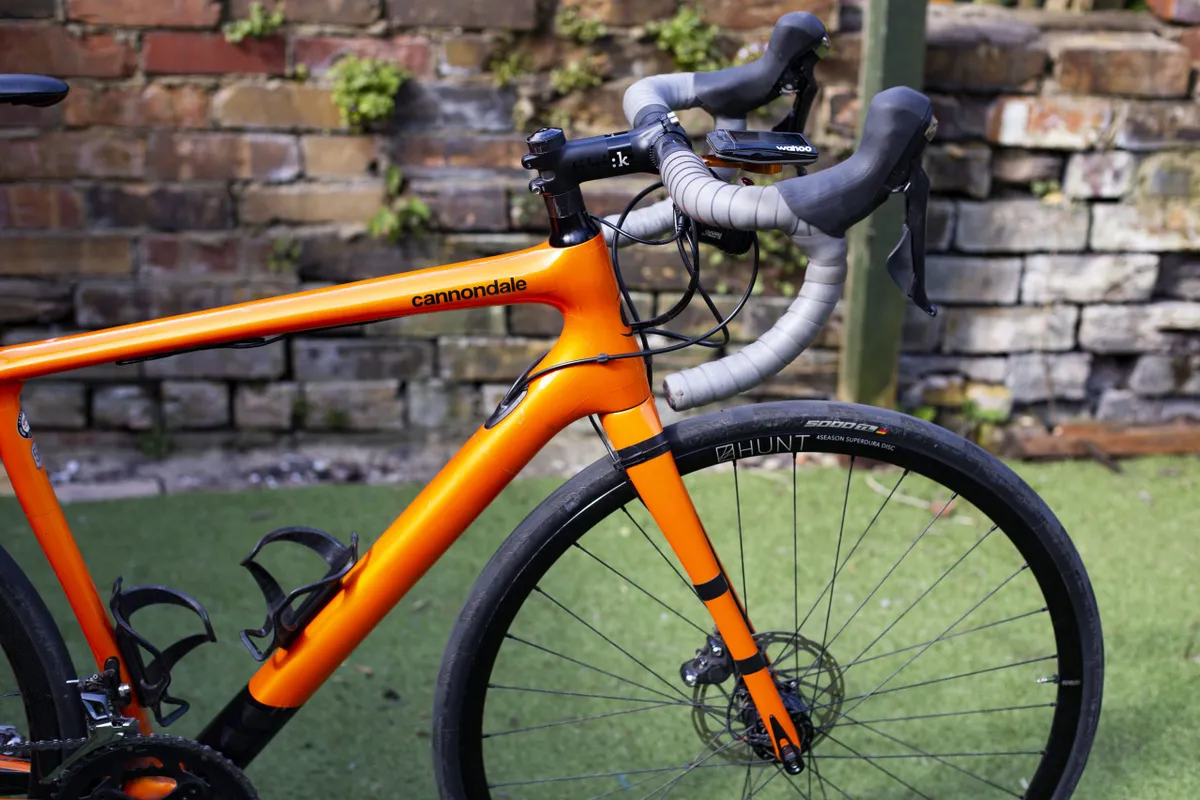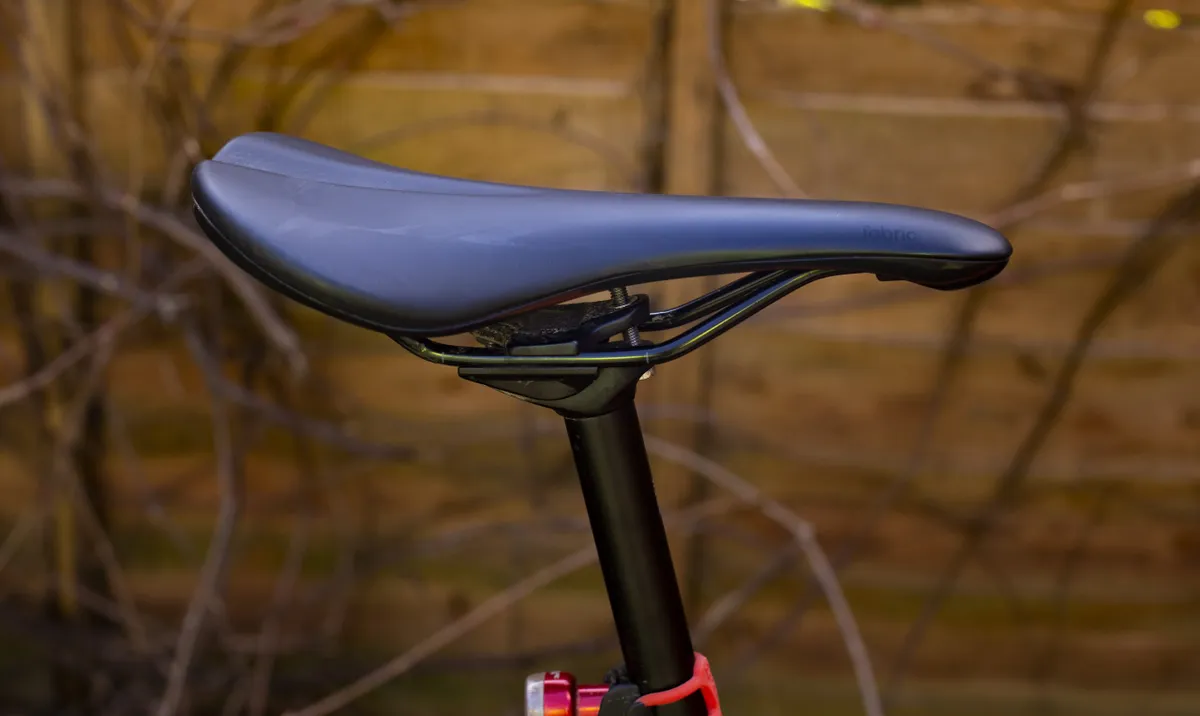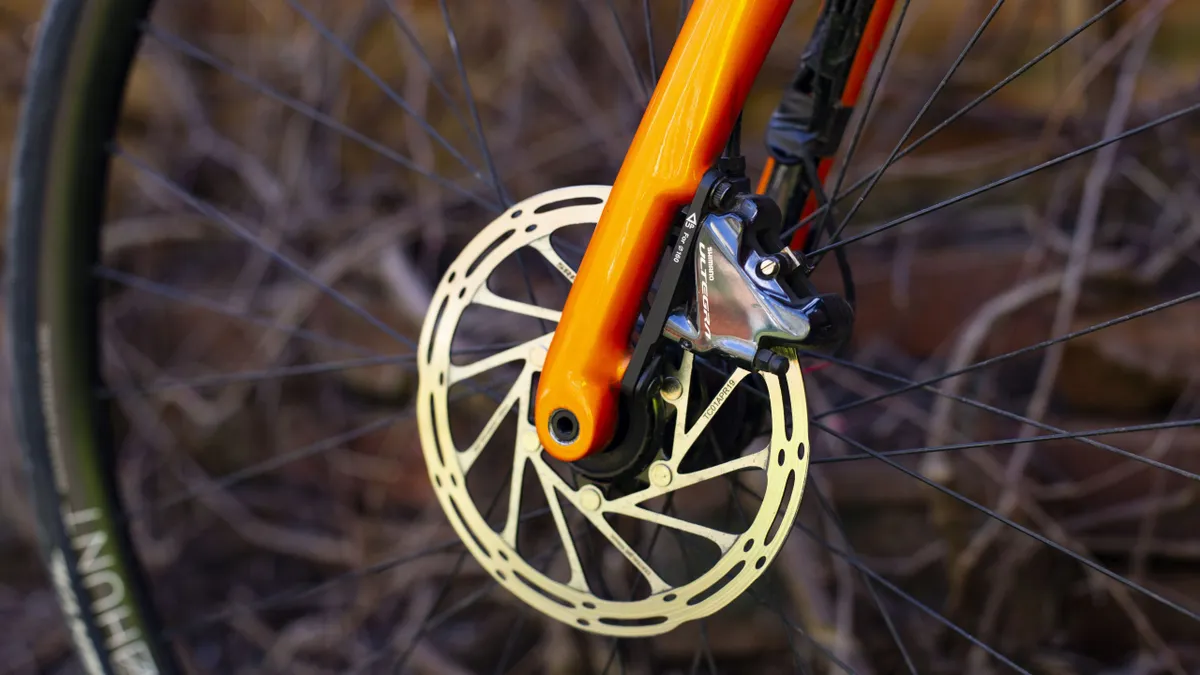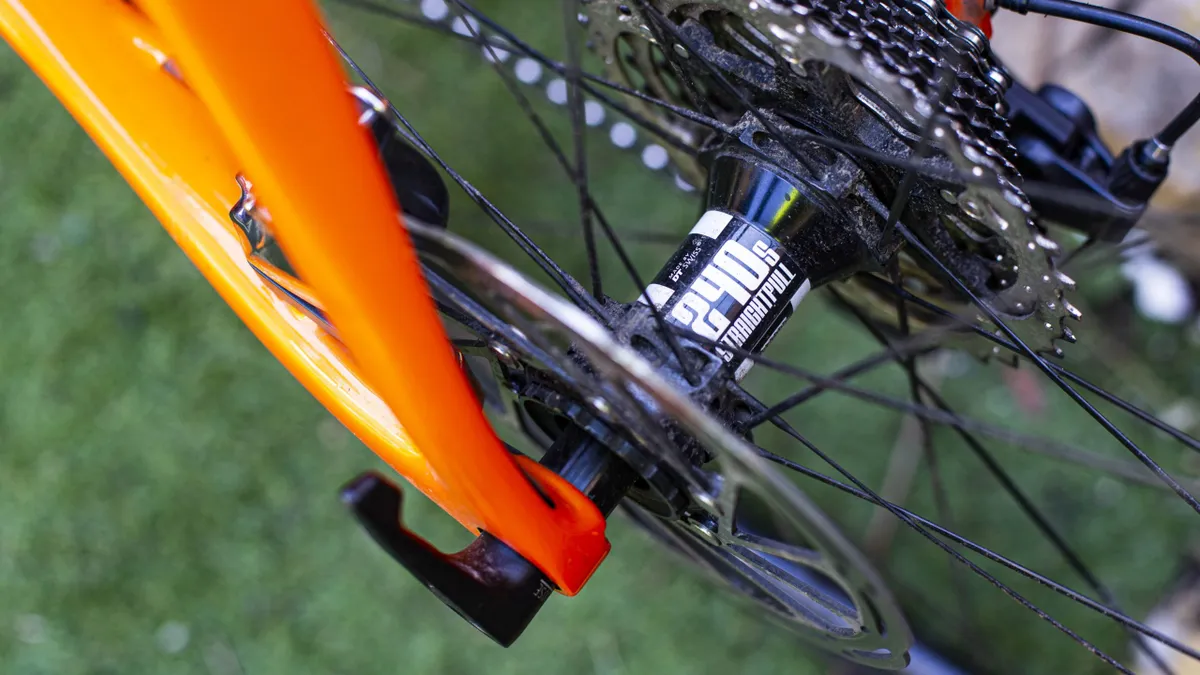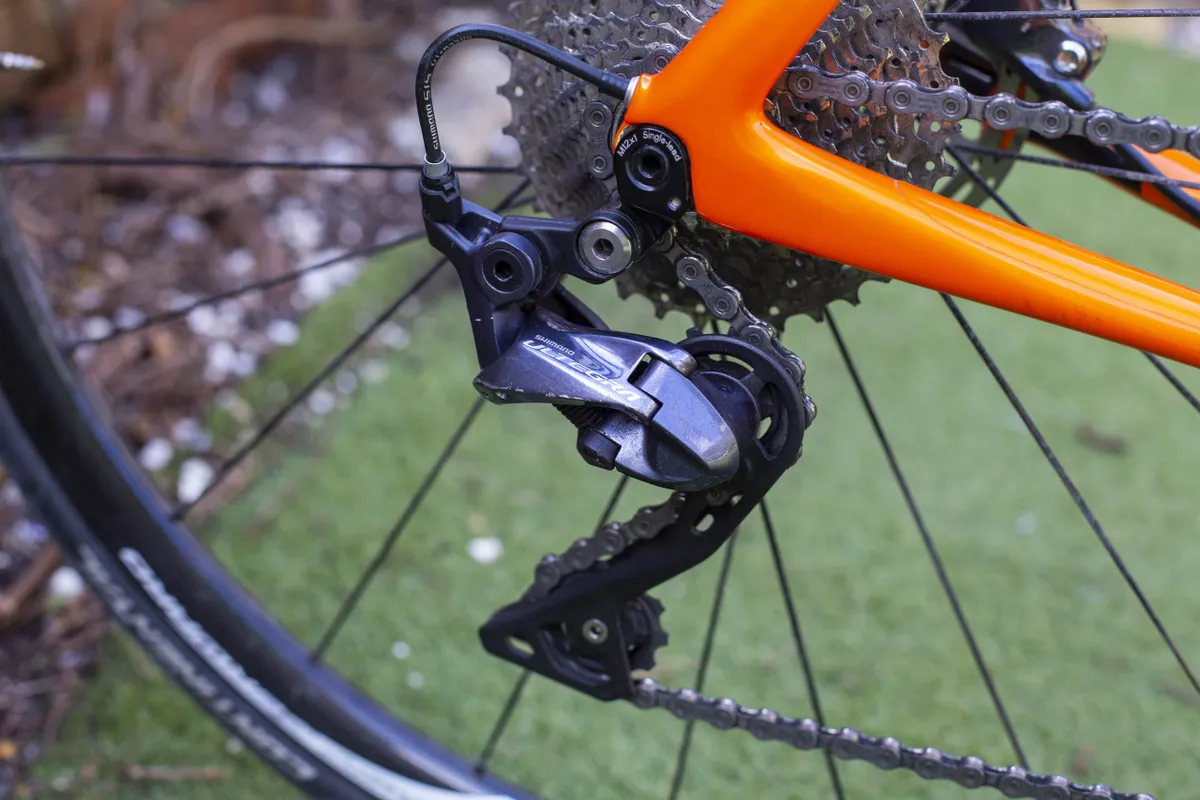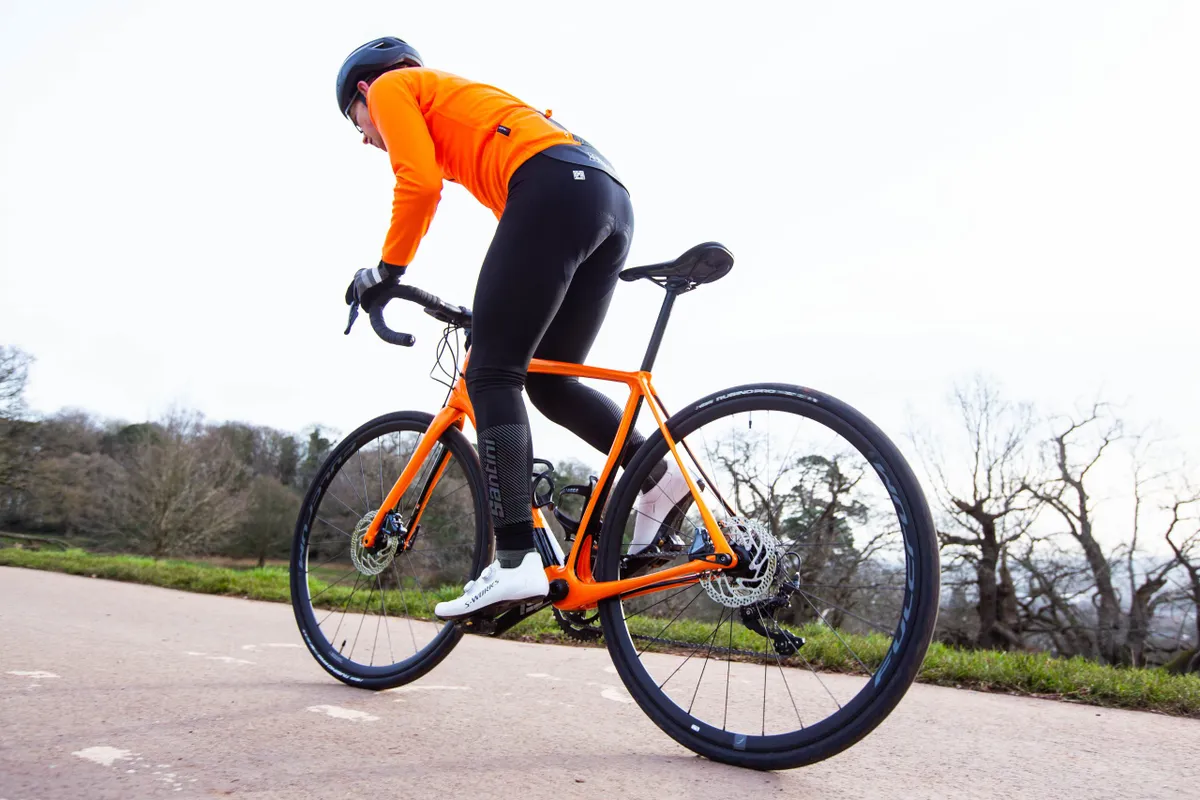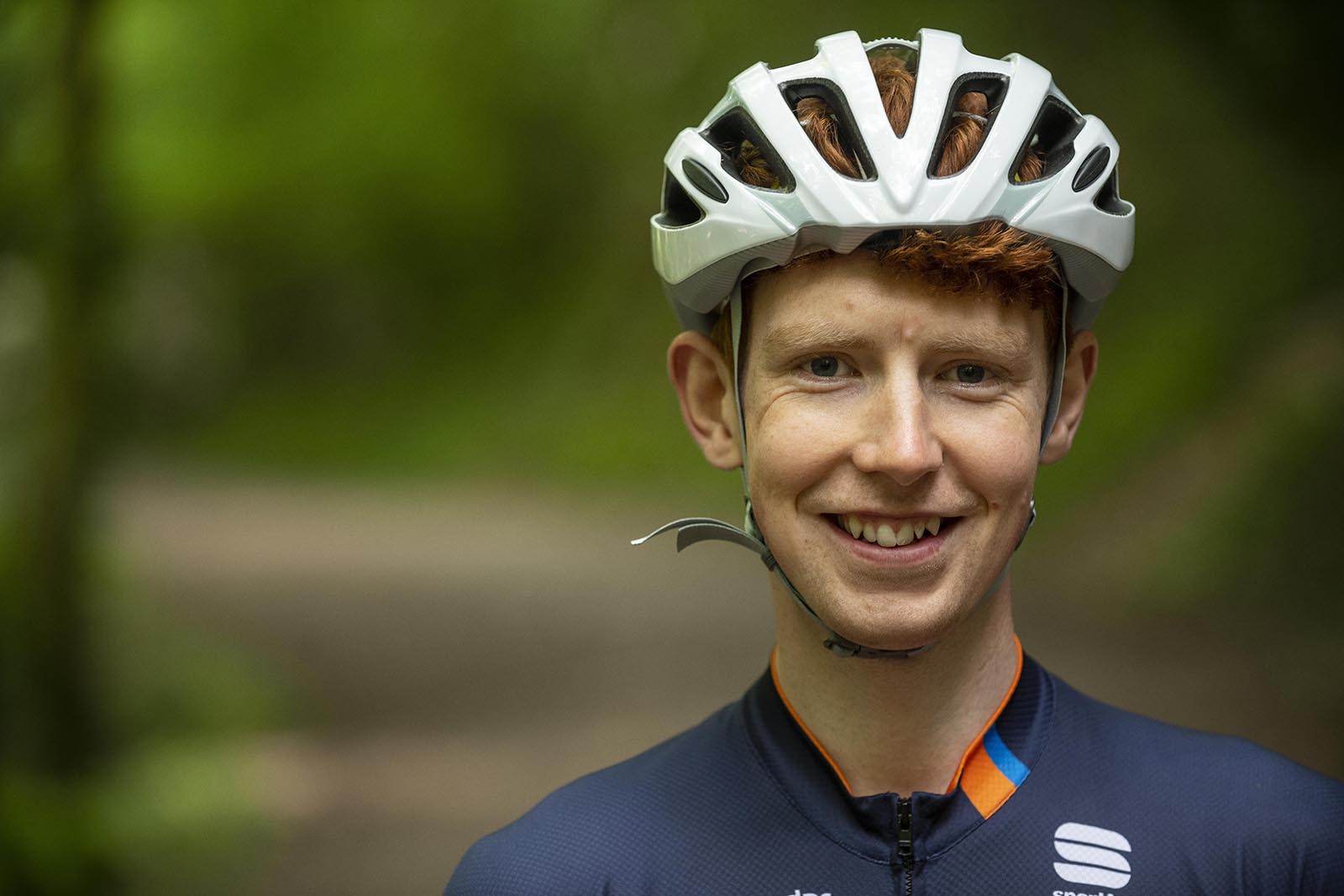The Synapse sits firmly in the endurance road bike category, but Cannondale says it differs from its other road bikes thanks to its ride characteristics, which are focused more around rider comfort than flat-out speed.
The Synapse is available in three different frame versions ranging from the cheaper aluminium model to a standard carbon frame, and then a Hi-Mod version which has a higher strength to weight ratio. I'm testing the mid-range Carbon Synapse Disc Ultegra model.
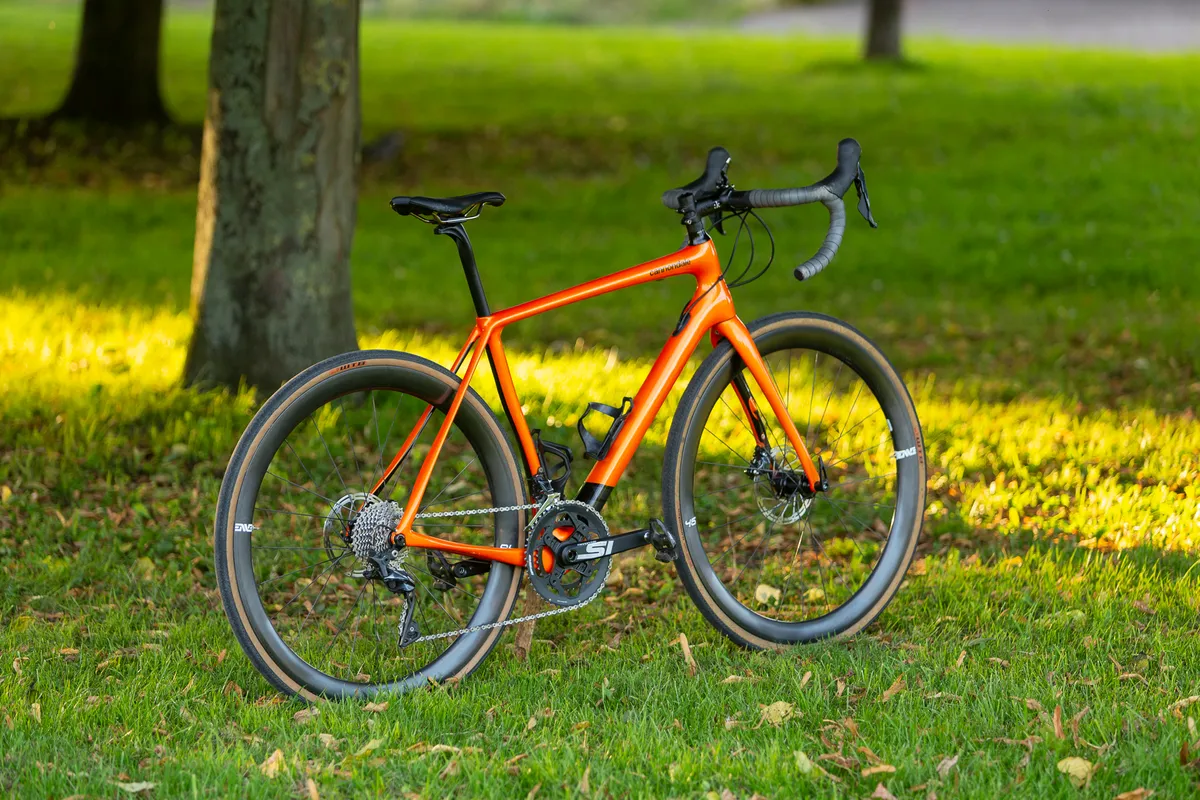
It would be fair to say that I've got a keen interest in gravel riding, which is lucky because, arguably, bikes designed for endurance have started merging with their gravel counterparts.
The Synapse is no exception, and with tyre clearance up to 32mm and its shock-absorbing SAVE tech, it's clearly been designed to take on gravel roads, such as those found in ultra-endurance races such as the Transcontinental.
I plan to test it out on mixed surfaces and some big miles on tarmac over the course of the year to see how it handles the different terrain.
Cannondale Synapse Disc Ultegra long-term review update three
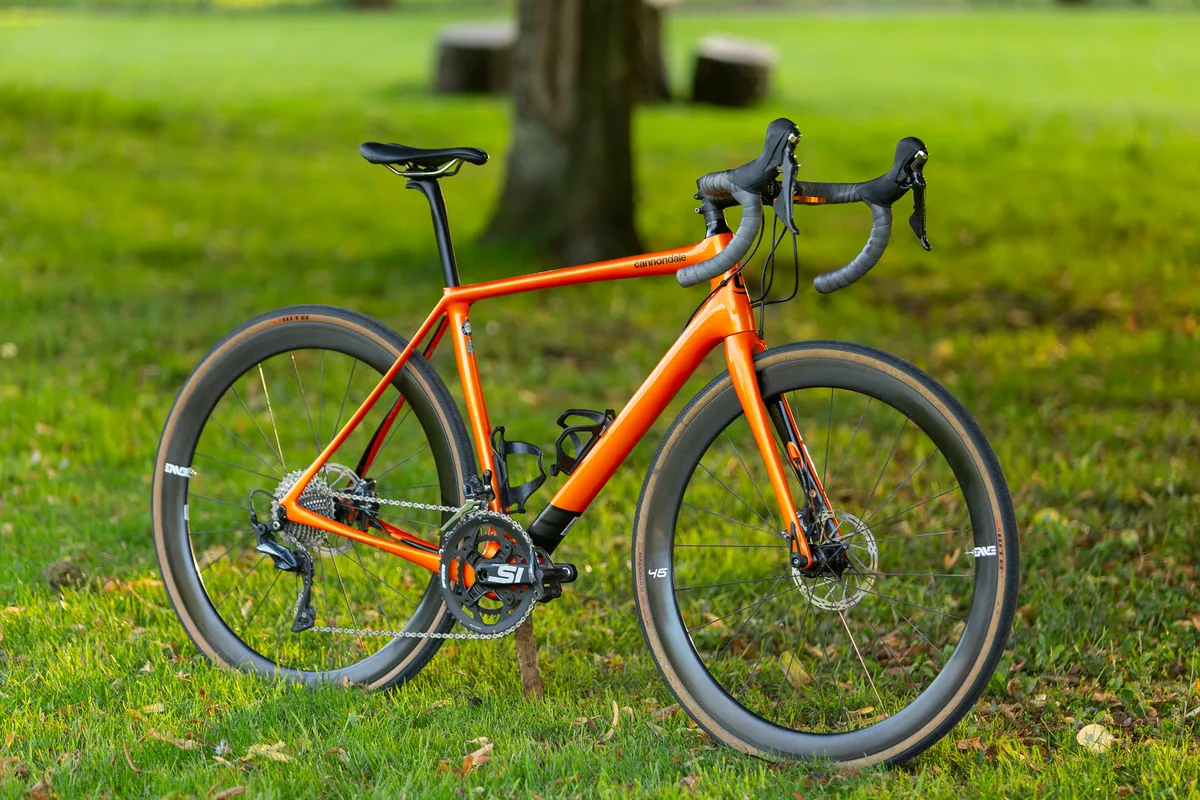
The bike has undergone some pretty significant upgrades since the summer, including Enve’s most affordable, but still rather expensive Foundation 45 wheelset (£1,800 / $1,600 / €1,800 / AU$2,250), and a Cannondale SAVE seatpost and Fabric Line S saddle in a bid to add a bit more comfort.
The Specialized Mimic saddle I'd used on the bike hadn’t been particularly uncomfortable, but I'm still searching for my perfect saddle.
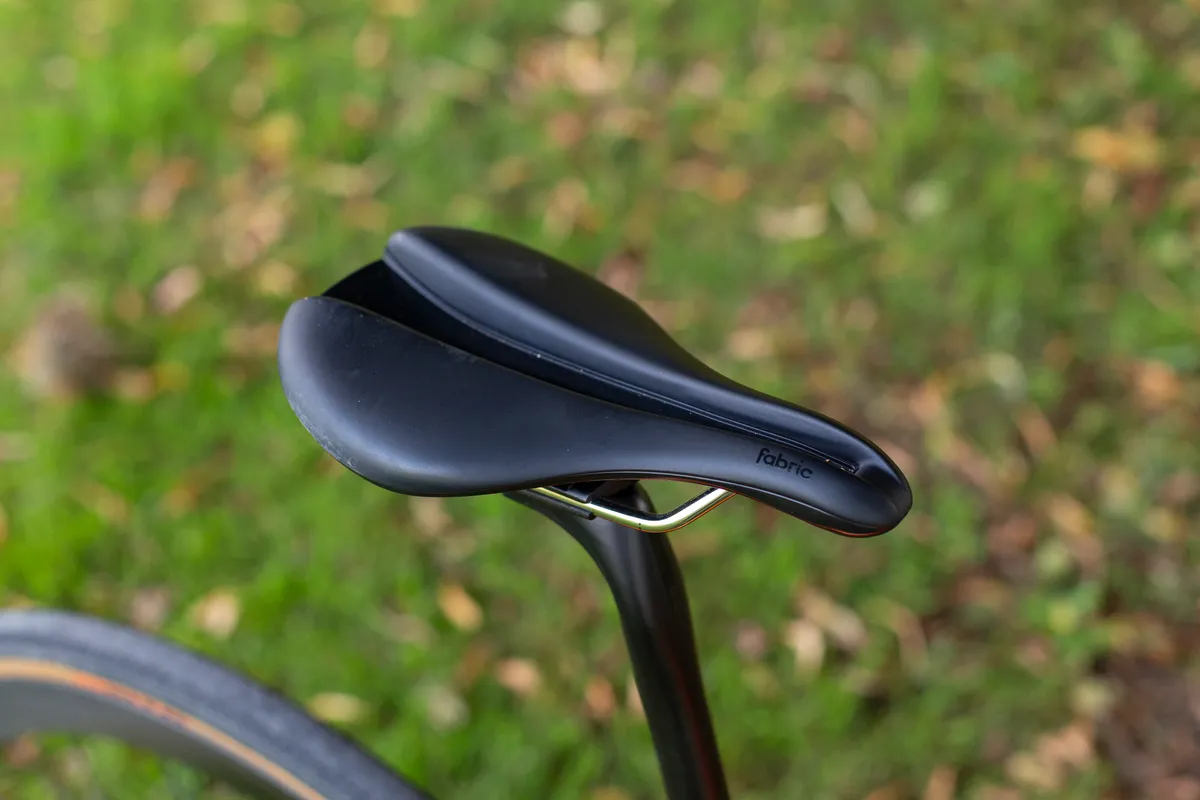
Even though my dreams of riding huge distances day after day have not been a reality this year, due to on-going knee problems, I’ve been able to refine the bike and my bikepacking gear to what I think is a very capable and competitive ultra-distance setup.
Expensive hoops
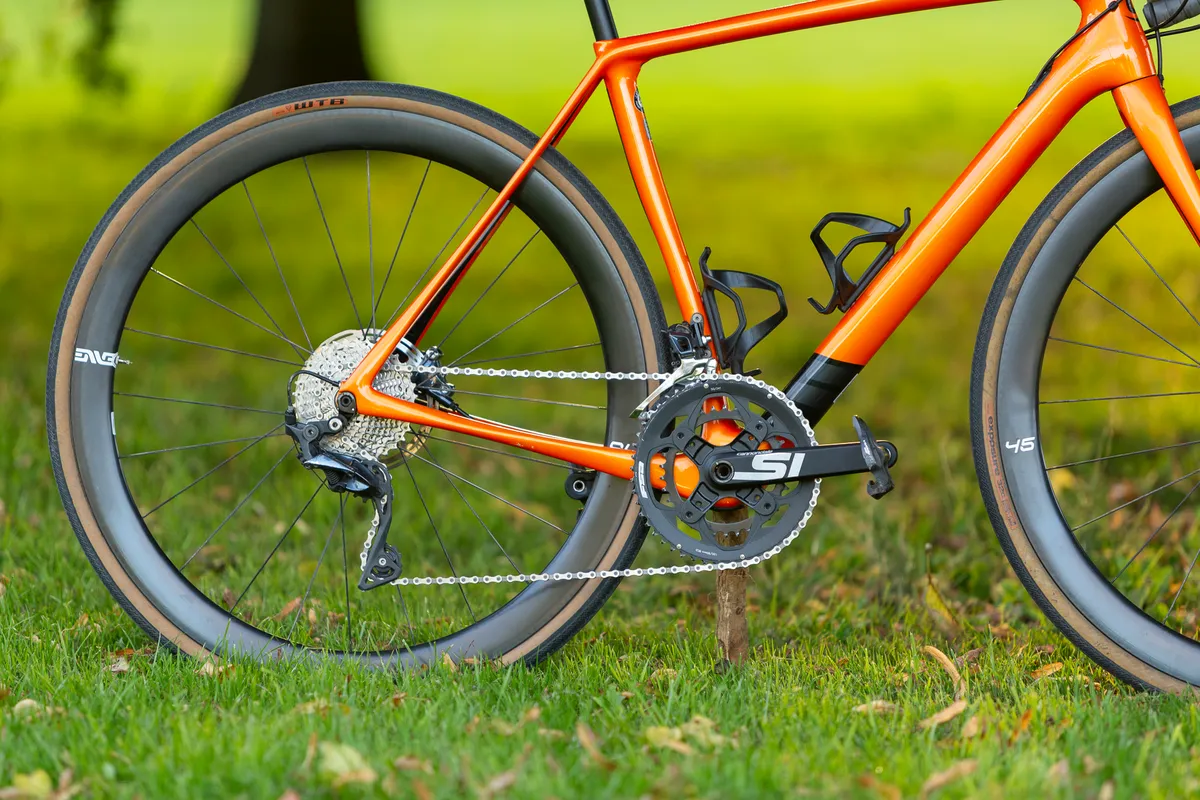
The beautiful Enve Foundation 45 wheels replaced Hunt’s Superdura Dynamo on the front and the now slightly outdated version of the FastForward F3 on the rear. As the name suggests, these are 45mm deep carbon rims with Enve’s own hubs.
This deeper section rim promises better aerodynamics without incurring a big weight penalty and at a 1,540g claimed weight for the pair, they are certainly lighter than the Fulcrum 600DB wheels that come specced on this Ultegra model.
The stock Fulcrums weighed 1,690g for the pair and, although they can be set up tubeless, they have an internal width of 17mm compared to the Enve’s 21mm.
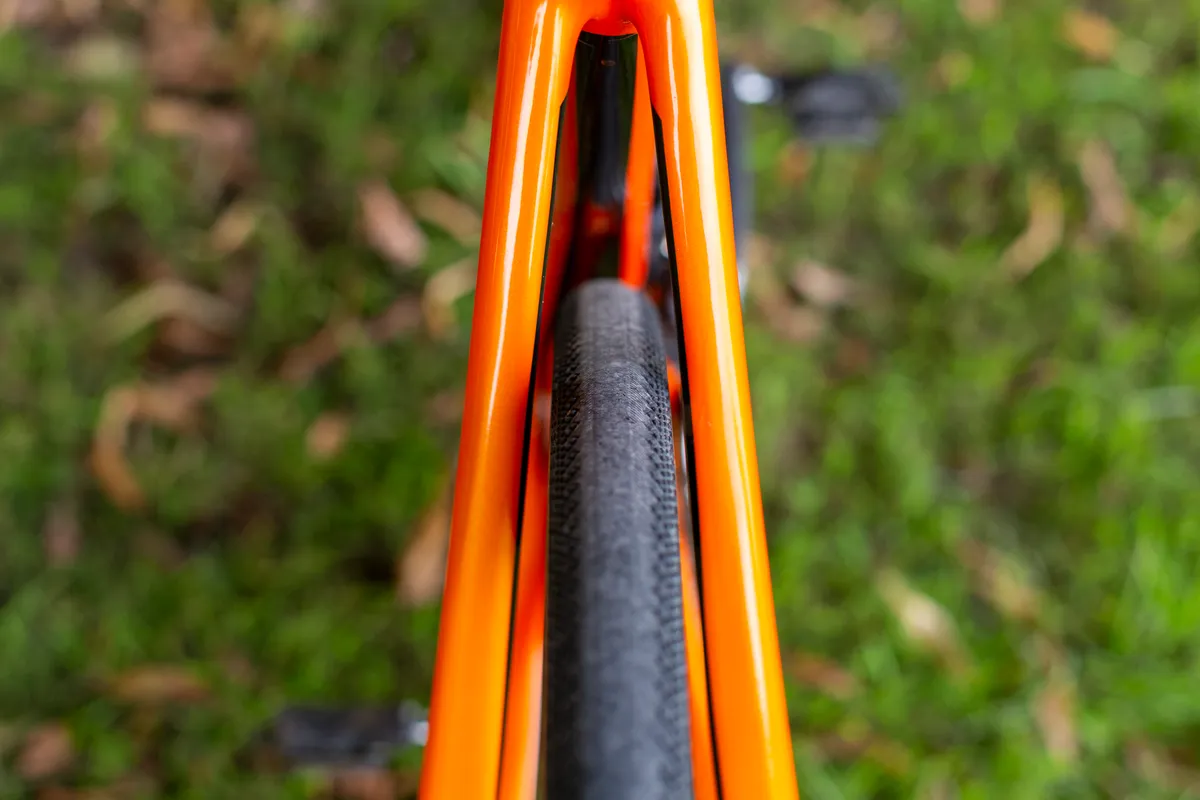
This means that tyres fitted to the Enves will not only measure slightly wider for the same weight but also reduce the light bulb shape profile of the tyre, which can happen as a result of a wider tyre in a narrower rim.
The advantage? Better contact with the road and the promise of more grip and comfort.
The Enve Foundation wheels are considerably cheaper alternatives too, when compared to more established wheelsets. At £1,800 / $1,600 / €1,800 / AU$2,250 they aren’t cheap, but they do represent around a £1,000 saving from the cost of other similar wheelsets, such as Enve's SES 3.4 AR.
How has Enve managed to do this? While they are still manufactured in the same Odgen factory in Utah, by changing to a hookless rim profile, sticking to disc only and using slightly cheaper hubs, the company has been able to increase manufacturing efficiency and reduce that premium price-tag.
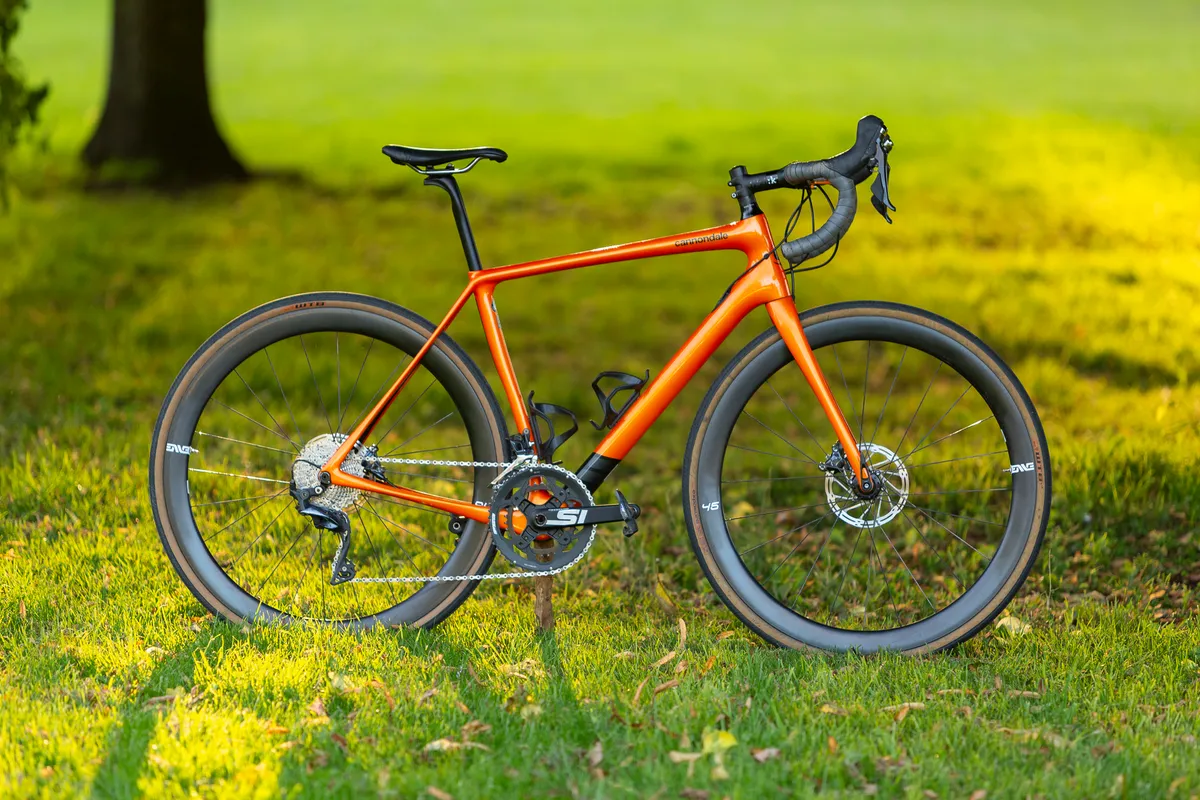
Without a wind tunnel at my disposal it’s difficult to measure the aerodynamic advantage the wheels provide. However, on the first windy day I rode the bike I felt a slight change in handling, but having ridden them now for a couple of months, I can say I haven’t noticed the wind blowing me off line and it has improved the ride no end.
The combination of a wider tyre and more aerodynamically focused wheels has resulted in a noticeable improvement in comfort, while still retaining the ability to plow through potholes and damaged road surfaces without flinching.
Although I’m not able to back it up with numbers, I am confident that the bike is faster, particularly over rougher roads. Albeit an expensive upgrade, the wheels have unleashed the Carbon Synapse’s endurance race pedigree.
Anecdotally, I also noticed as soon as I rode out on the Enves a slight pressure to ride fast. Whether this was because of the audible rumble of the deep section carbon rims or the fact I had £1,800 worth of wheels spinning beneath me, I can’t be sure.
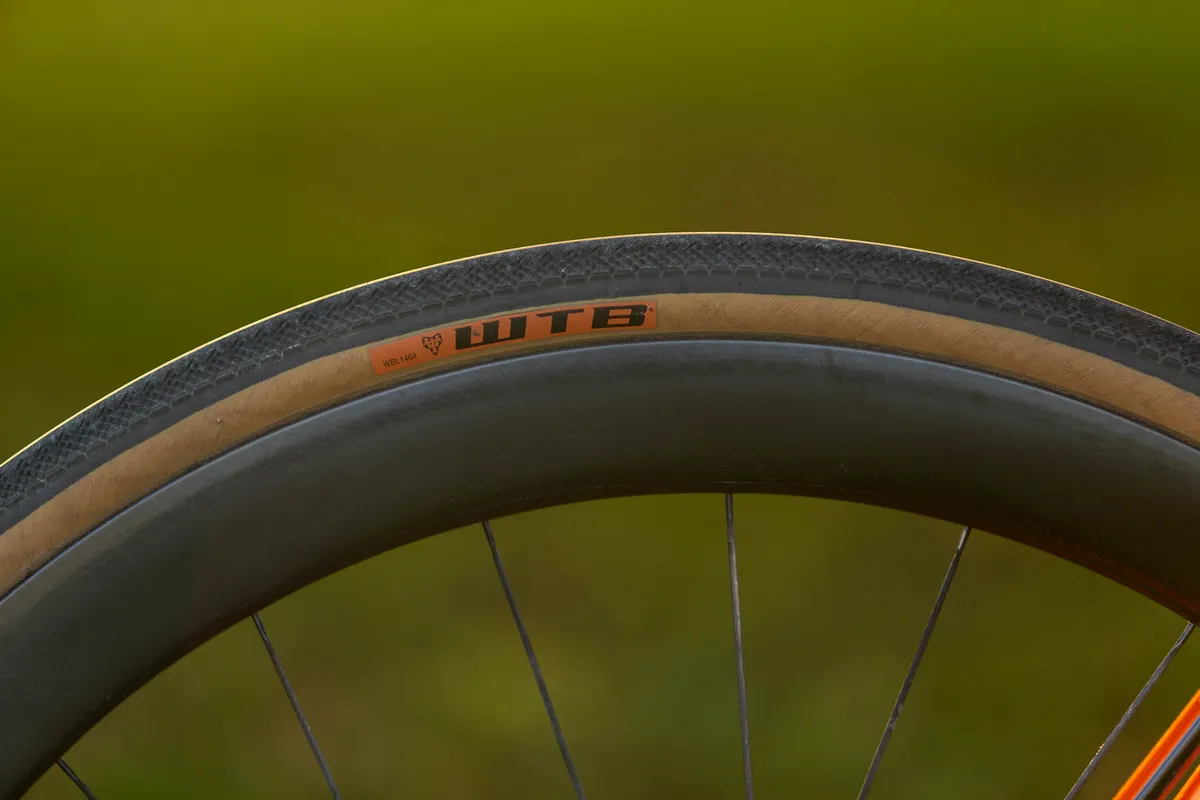
The rims are hookless, so I had to replace the Continental Grand Prix 5000 28mm tyres, since they’re not on Enve’s compatible tyres list.
Thankfully, my tried and tested WTB Exposure 32mm tyres are, and with their increased internal rim width, I’m now able to get more comfort out of the Synapse than with my previous wheel and tyre setup.
It is worth noting that I failed to set up this combination tubeless. This was due to the tyres suffering from several holes too large to fill with sealant, sustained from my Transatlantic Way ride in 2019. To really get the most out of the wheels, I do intend to set them up tubeless with an approved tyre.
Added comforts
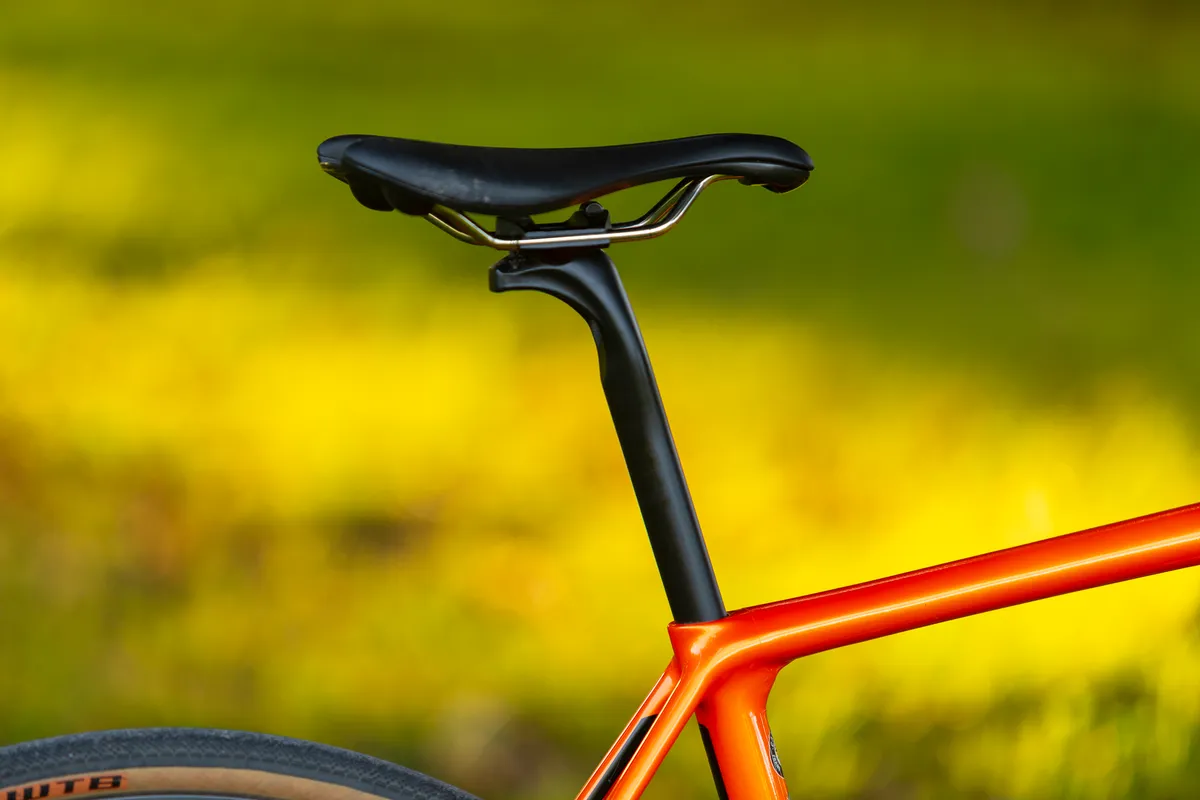
I also changed the regular aluminium seatpost to Cannondale’s SAVE model, which is made from carbon fibre and is said to add “subtle compliance” to the already damped ride feel.
It is difficult to feel changes in comfort to the ride, though, which I think is because the bike is already very well damped. Perhaps it would be more noticeable on a stiffer race bike, but after a very long ride I’m grateful for any kind of additional comfort.
Unfortunately, due to a knee injury this year, I haven’t been able to test the Synapse under full endurance conditions, but I’m optimistic my rehabilitation will put me in a good position to enjoy some longer rides this winter.
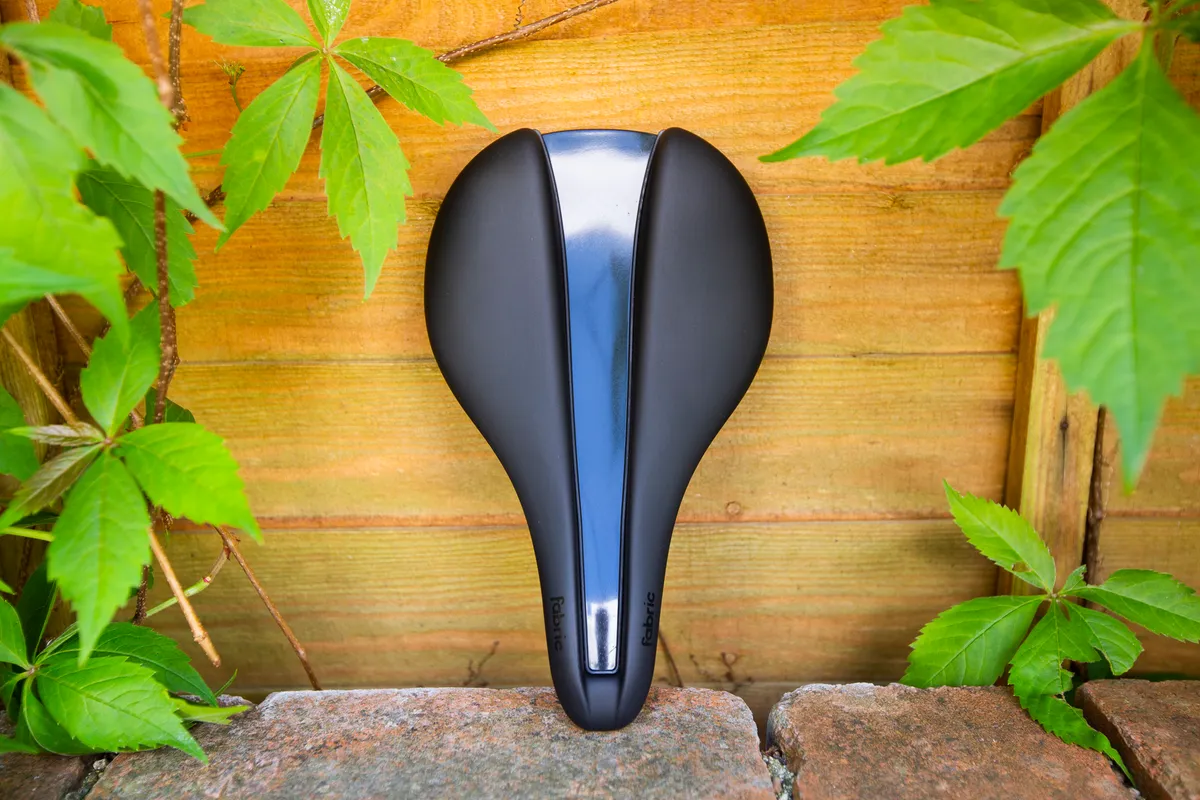
For some reason, I have always been able to hold a better level of consistency with my training over autumn and winter, and I’m really looking forward to modifying the Synapse to make the most of it. With that in mind, I’ve got tubeless tyres, mudguards and the dynamo wheel on my list for my next update.
Older updates continue below.
Cannondale Synapse Disc Ultegra long-term review update two
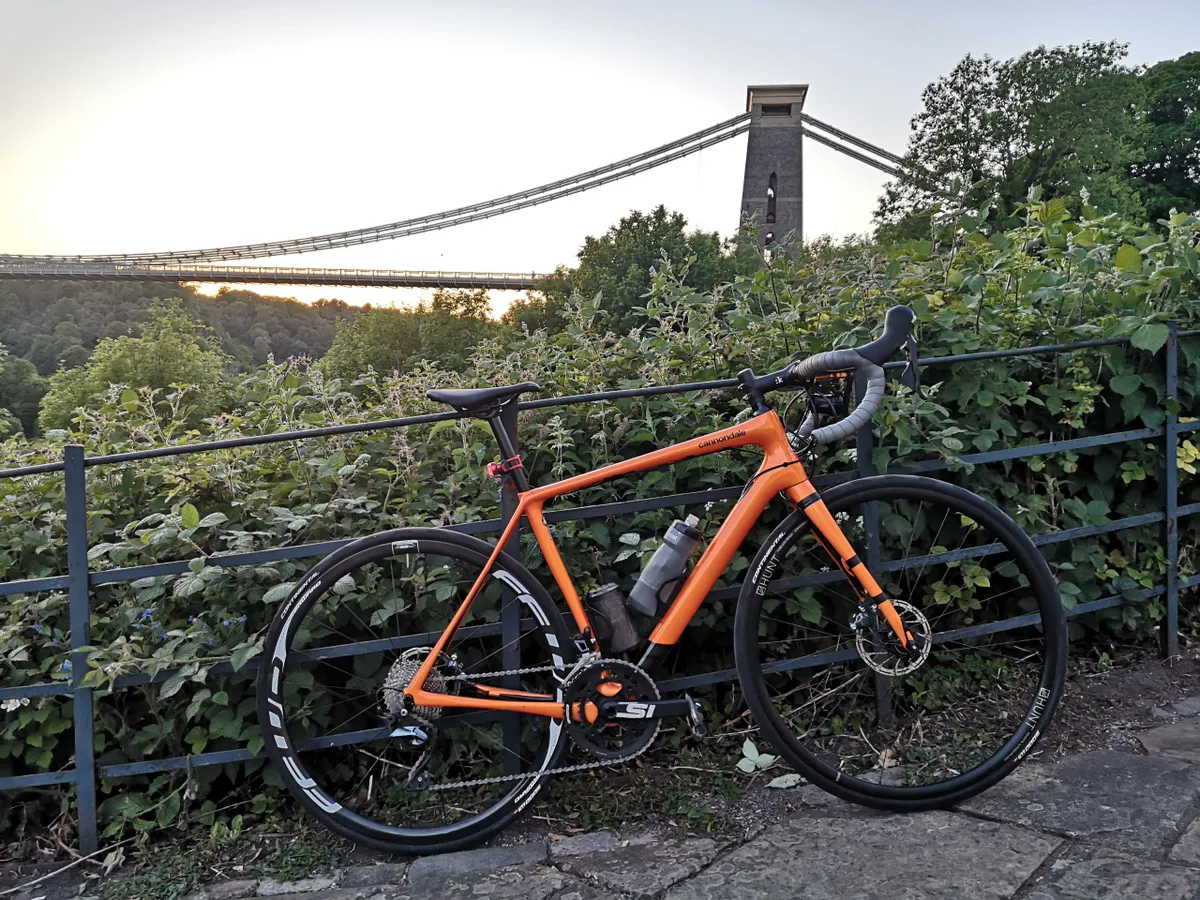
I’ve not made any significant changes to the Synapse for this update because the last few weeks have been all about managing my on-going left and right knee troubles.
I have lowered the bar height a touch, replaced the Fabric Scoop saddle with a Specialized Mimic and made a slight change in saddle angle, though.
However, what remains the same is the Synapse's amazing handling and comfort that's impressed me since I began testing it in February. But I do have some pretty exciting upgrades planned for my next update, so stay tuned for that.
I found the stock Fabric Scoop lacking in comfort and a little harsh over bumps, I always struggled to get truly comfortable. So, after searching for some time for a saddle better suited to my needs, I settled on Specialized’s Mimic, which is an evolution of the well-known Power saddle.
Bear in mind, saddle comfort is extremely personal, but after around 800km on the Scoop it won’t be a saddle I go back to using.
Aero gains
Since my rides haven’t been particularly long or far from home during the global pandemic, the extra comfort I've had from the relatively tall front-end hasn’t been worth the, albeit probably small, aerodynamic disadvantage.
As a result, I have dropped the bar height by another 10mm since the last update and feel the bars are now in a more natural position. The ride feels considerably more sporty when compared to the initial setup.
In the future, should I want to add aero extensions for longer, multi-day rides, I’d set these a minimum of 20mm higher than the current position of the handlebars. Although hard to say without setting up, I believe this could give me a good compromise between comfort and aero advantage.
After making the bar height change, I felt myself ending up on the nose of the saddle, especially during harder efforts. So I've tilted the saddle nose up by a few degrees to help me find a more sustainable position, not forgetting to lower the seatpost by a few millimetres to compensate.
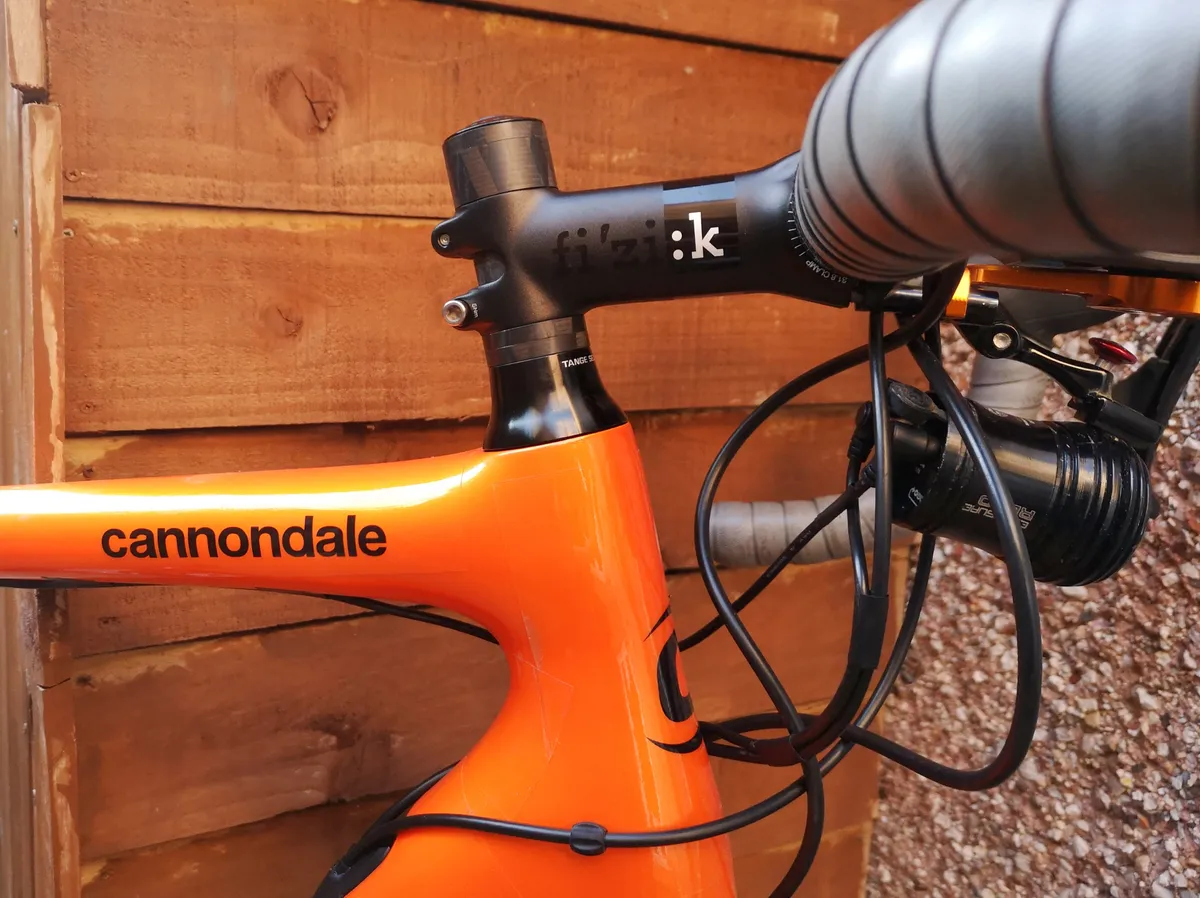
Pain-free riding
Reversing long-term knee damage is a notoriously difficult job and, having had a great spell of rehabilitation with a period of pain-free riding, I fell back to the knee niggles that had previously dominated my rides. It came at the peak of my latest build up in fitness, when presumably I overcooked it.
That brief experience of pain-free riding felt so good and I'm determined to not push too hard too early again, so here goes a chilled-out summer of riding where my knee rehab comes before my fitness.
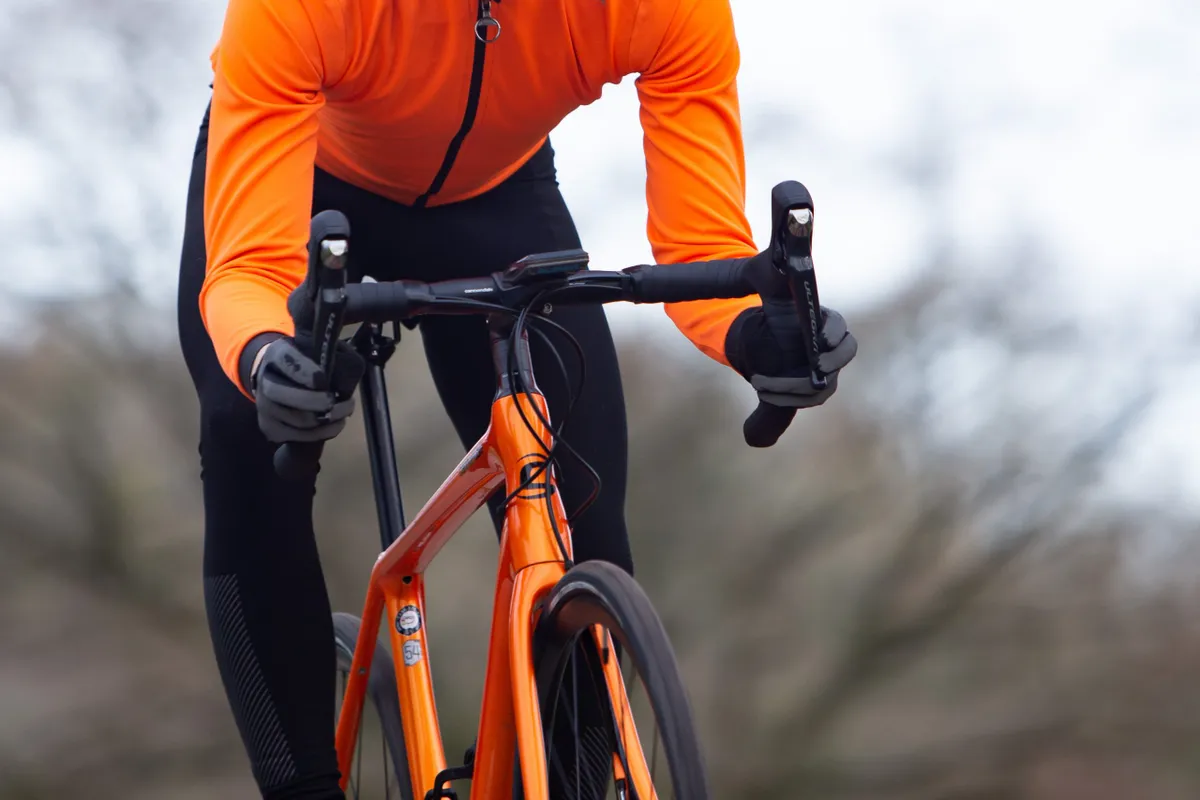
I’ve been combining my rides with a dedicated stretching plan since January 2020 and focusing on areas of chronic tightness, with some strengthening exercises too.
Metering my imbalance
For a while now, I've noticed my right leg is working much harder than the left. Over time this has resulted in quite a big imbalance in my body and although I can’t quantify the difference yet, I believe it must be having an impact on my knees.
So, for now, I will continue the strengthening exercises to try and address the balance issue and see how they help my rehab.
Of course, a double-sided power meter, such as on a set of Garmin Vector pedals, would allow me to quantify how much of an imbalance is present and track the difference in power between my legs over time. Perhaps this is a test for a future update.
Older updates continue below.
Cannondale Synapse Disc Ultegra long-term review update one
Due to the pandemic and everything that goes with it, I haven’t been able to ride much longer than a few hours at a time, which of course means I'm not really able to find out how the bike fares over longer distances.
Having said that, I am currently working through a knee injury which has plagued me on and off for a few years, so, for now, shorter and less intense solo rides combined with a rigorous twice a day stretching routine are really helping me to overcome my knee niggles.
The bike has done a fantastic job of keeping my spirits high though, and the frame's compliance still impresses me whenever I ride over lumpy roads.
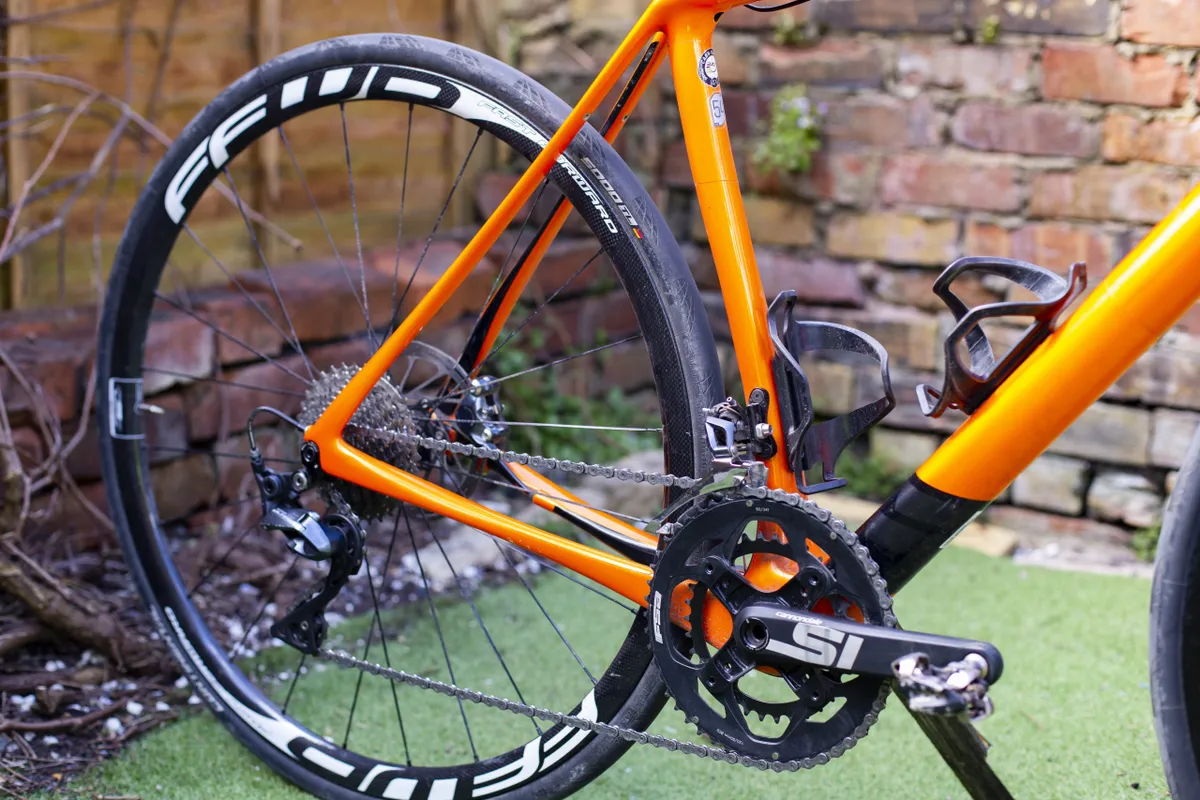
I’ve spent some time upgrading and optimising the bike for my needs too, which has been fun.
Unintentional weight savings
Although the Cannondale Three series bar and stem were both fine for the job, and their simple design and subtle graphics were decent looking, they were the first part to be swapped out.
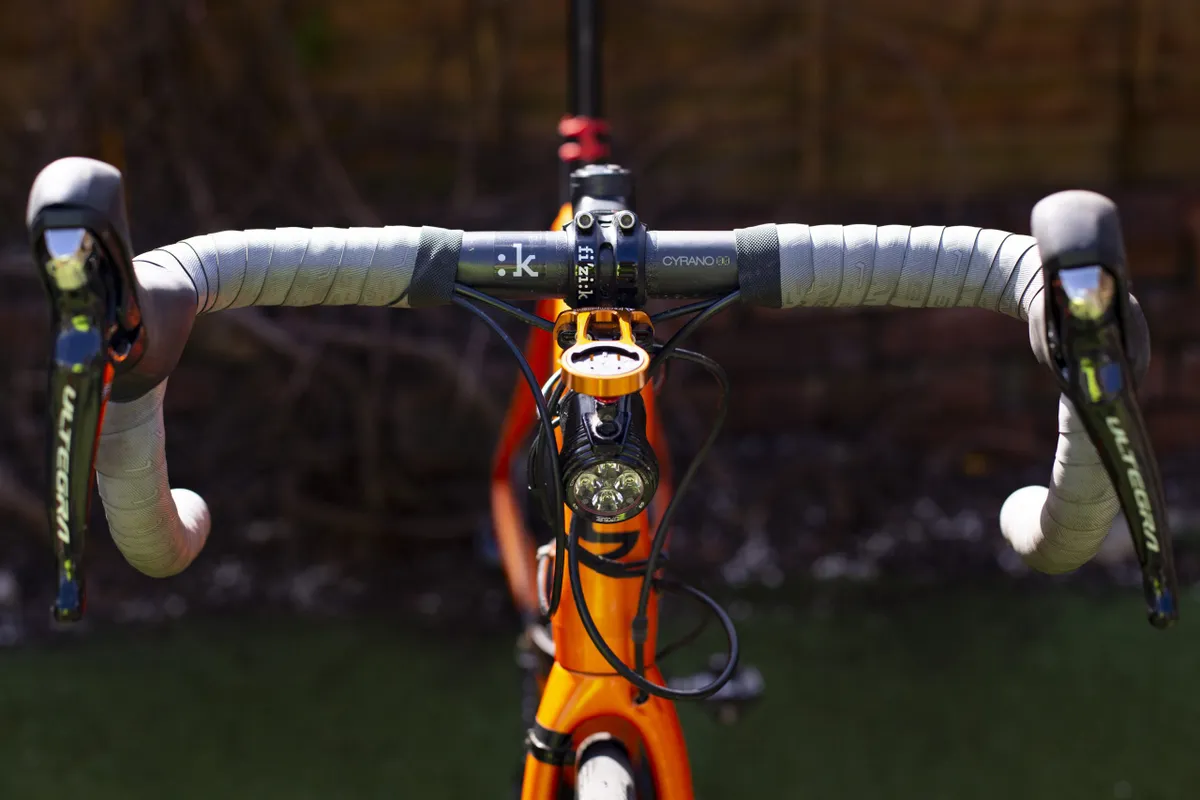
I chose to put on the beautiful and superlight Fizik Cyrano 00 handlebars. These were used on BikeRadar video manager Joe Norledge’s hill climb bike a few seasons ago.
The bars weigh just 182g, but it is not my intention to create a weight-weenie Synapse, instead they’re just really cool and a nice upgrade over the specced parts.
The Fizik bars are categorised according to their dimensions and flexibility of the rider. These bars sit in the middle of the sizing range and are named the Chameleon, combining a long reach with fairly compact drops for riders with middling flexibility.
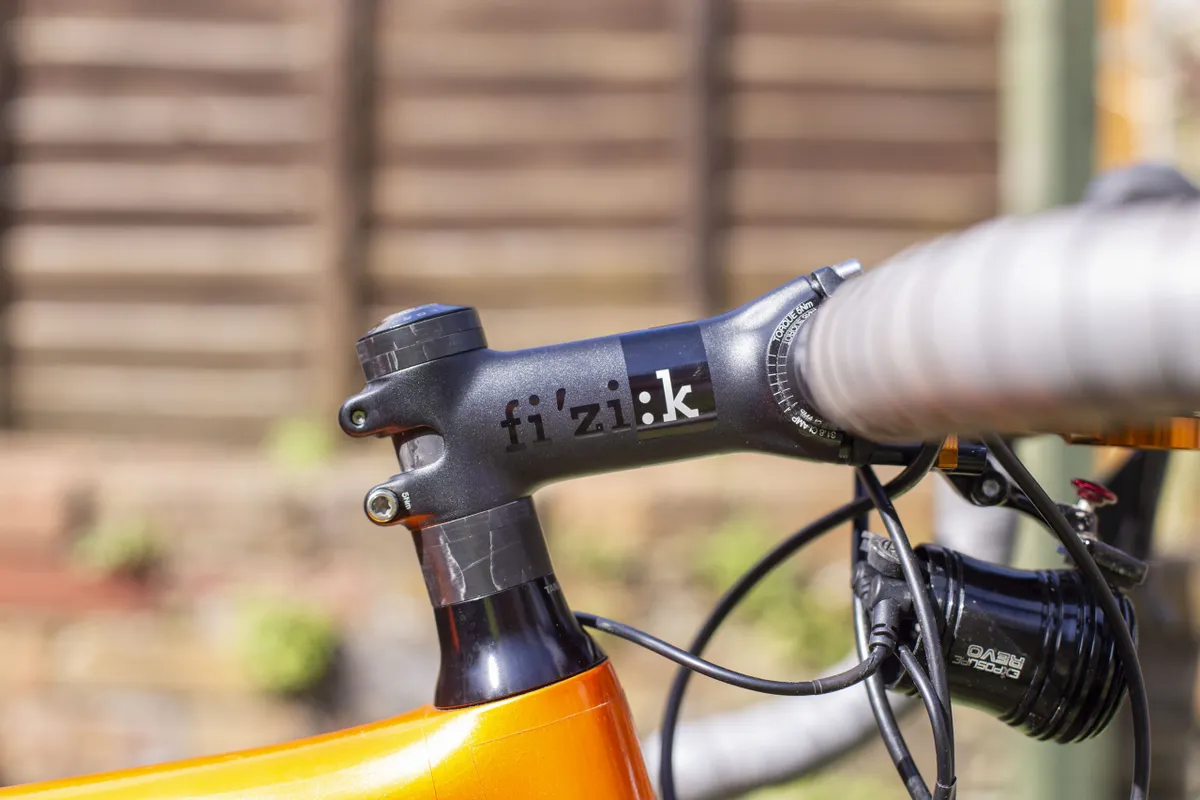
As for the stem, I couldn’t stand mismatching brands so I picked up a Fizik Cyrano R1 stem for a bargain price on eBay.
It retains the stock stem’s 100mm length and +/- 7-degree angle, but again it’s lighter and since I’ll be looking down at the cockpit a fair bit over the course of the year, it makes me happy.
Like I said before, weight is not my overriding concern for this endurance-focused bike, but changing these two parts saved 145g.
Swapping the bars meant I could change the bar tape, too. I really like Enve’s 3mm thick tape because it has a nice soft yet grippy texture that’s perfect for an endurance bike.
I wasn’t immediately enamoured with its grey colour, but I have to say it has grown on me.
Dynamo power
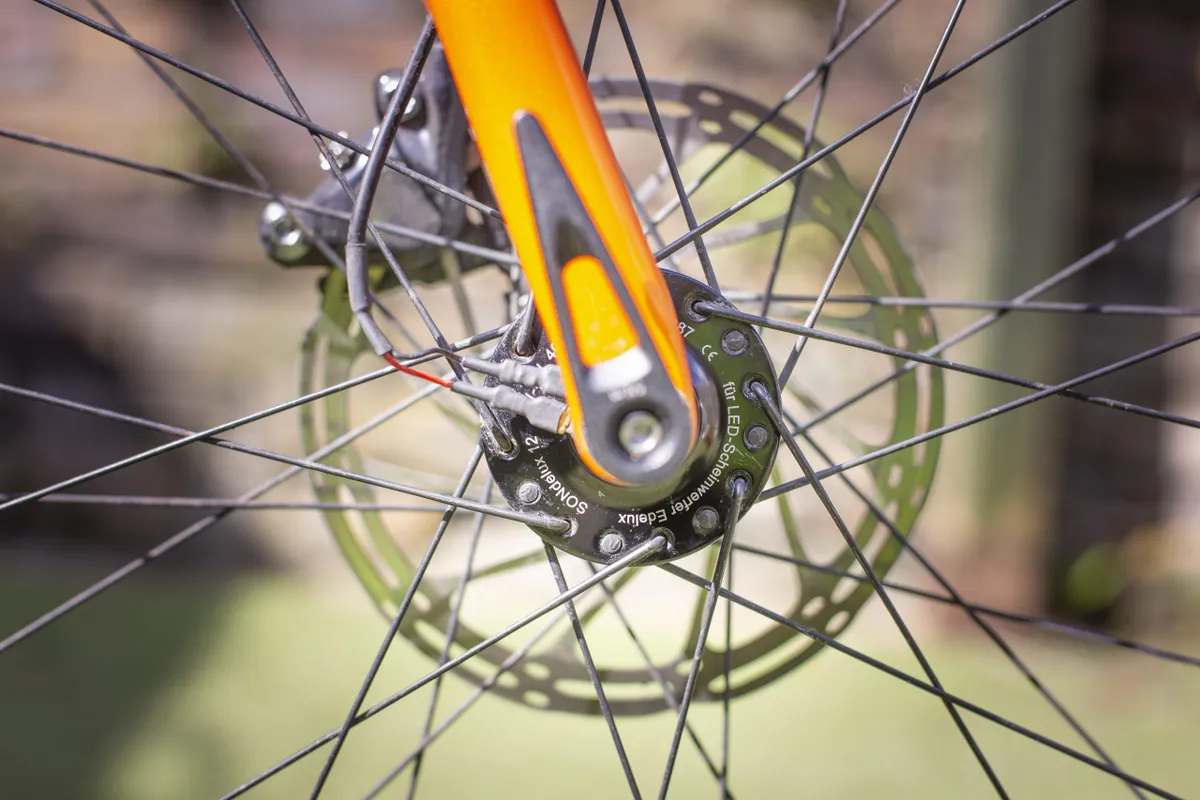
The stock Fulcrum 600DB wheels were one part I really wanted to change on the bike, so I could run a dynamo on the front wheel.
I’ve fitted a Hunt Superdura Dynamo front wheel set up with the ever-dependable Exposure Revo front light and Exposure Red Eye on the rear. To secure the wiring to the frame, I’ve gone with the slightly inelegant solution of good old electrical tape.
I have used this in the past for dynamo lighting and haven't had any issues, so I have faith in the tape!
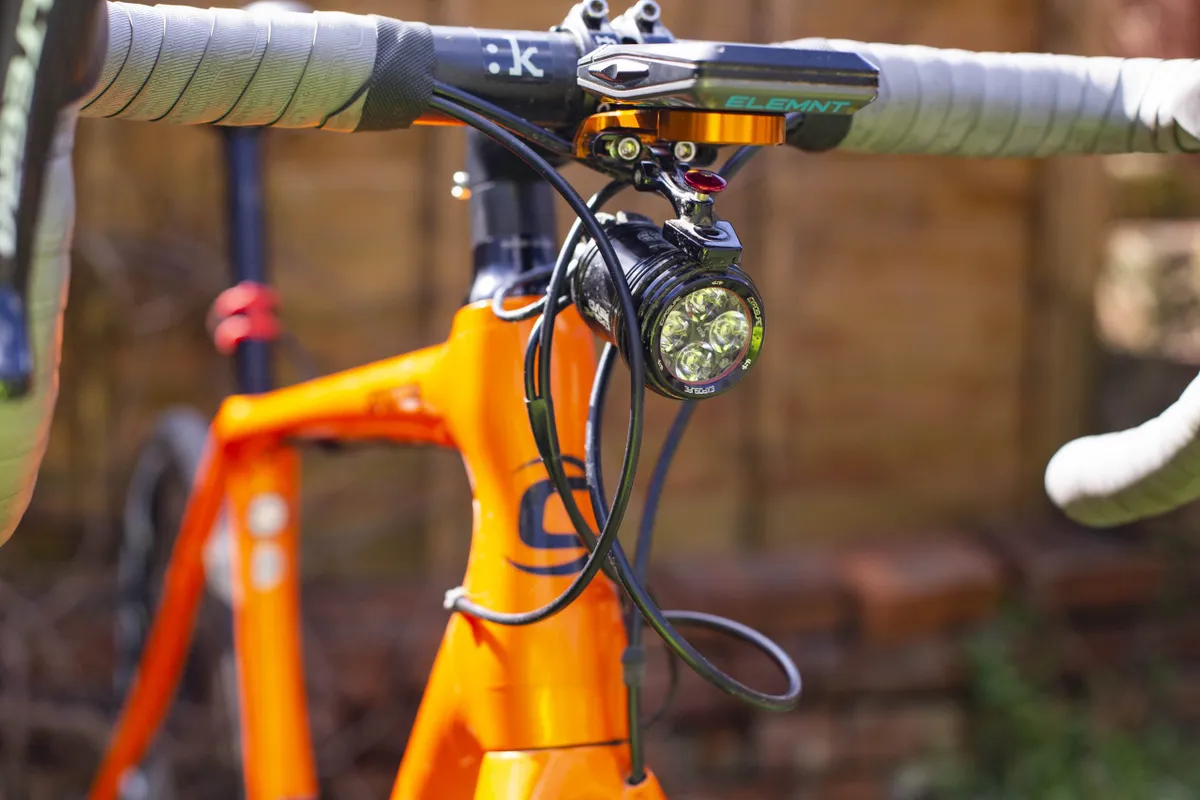
The bling GPS mount from JRC Components that’s bolted onto the lower stem mounts has allowed me to mount the Exposure Revo front light at the same time, thanks to the extra-long bolts and spacers supplied with the mount.
This has given the bike a satisfyingly minimalist cockpit, although it’s a shame about the messy cables, which I still can’t help but focus on.
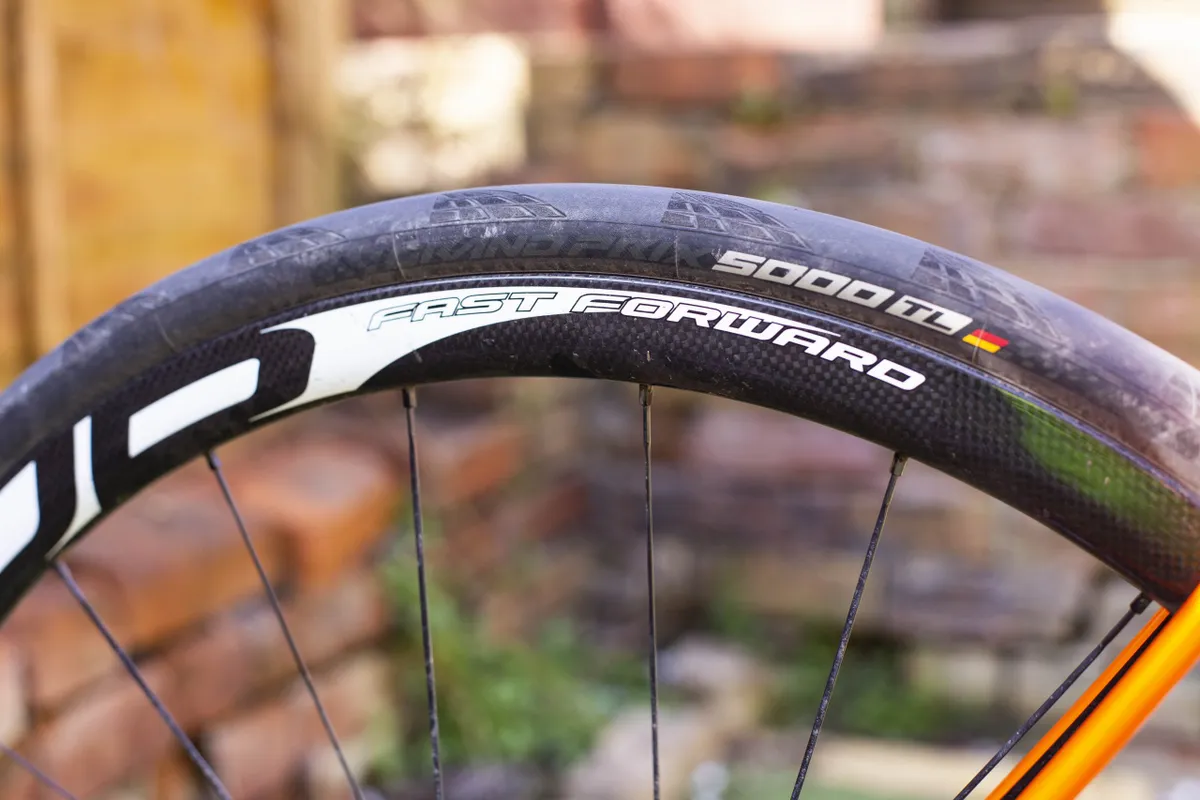
I swapped the rear wheel for a carbon-rimmed Fast Forward F3 Disc. The rim is built onto a DT Swiss 240s straight-pull hub that’s well known for its simple and easy to service ratchet system freehub, which produces a subdued but deep purr when you freewheel.
There are a number of downsides to the Fast Forward F3 Disc wheel.
First up, it is not tubeless compatible and because I am a tubeless convert and have got used to the lack of punctures and lower pressures you can achieve with the system, this can be a bit frustrating.
The rim is also narrower than more modern tubeless rims, which means the tyre is noticeably narrower compared to the Hunt Superdura rim up front, although the Superdura rim is fairly wide at 20mm internal width.
Hard(er) core credentials
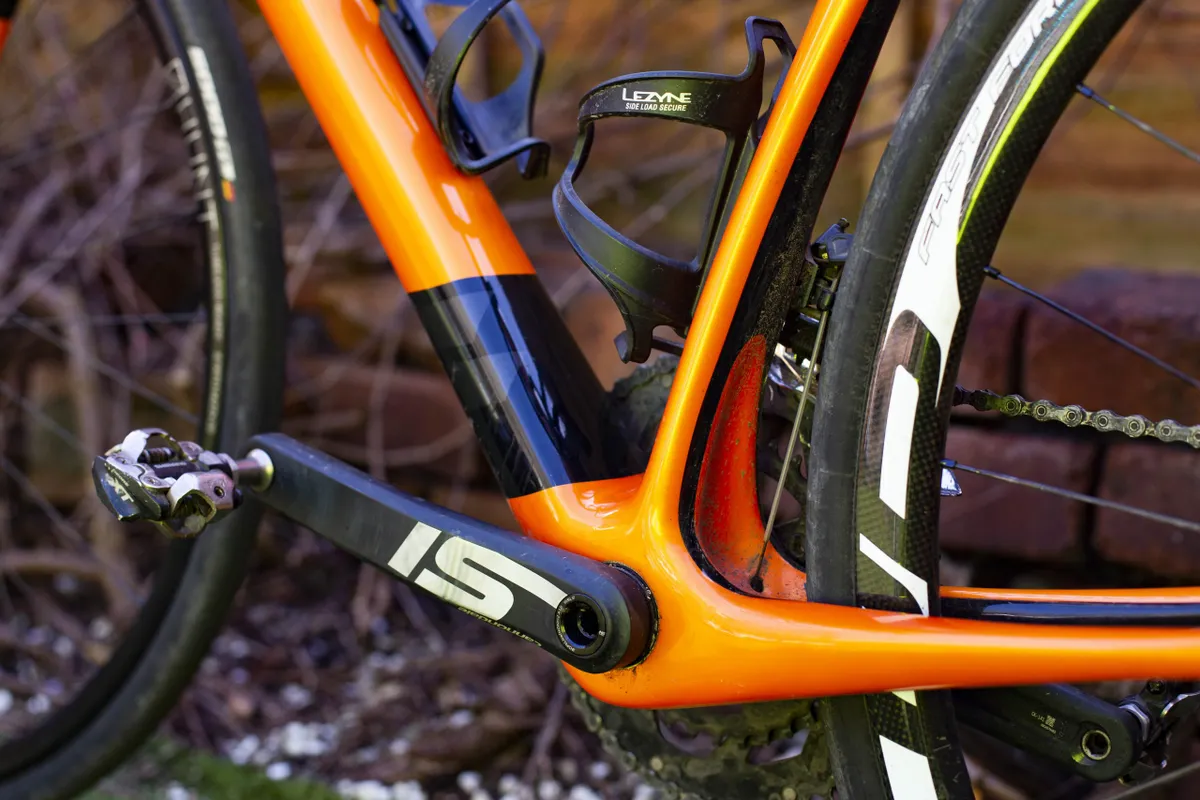
Because the Synapse has confident handling on mixed surfaces, I’ve taken the bike up and down a small local gravel trail, hopping over small drainage ditches.
While this is great fun, the F3D rear wheel buckled slightly, suggesting it wasn’t built quite well enough to withstand riding at the more adventurous end of the spectrum.
Upgrading the tyres from the Vittoria Rubino Pros to a pair of 28mm Continental GP5000 TL tyres was a worthwhile change, but obviously I’m currently only able to run the front tubeless.
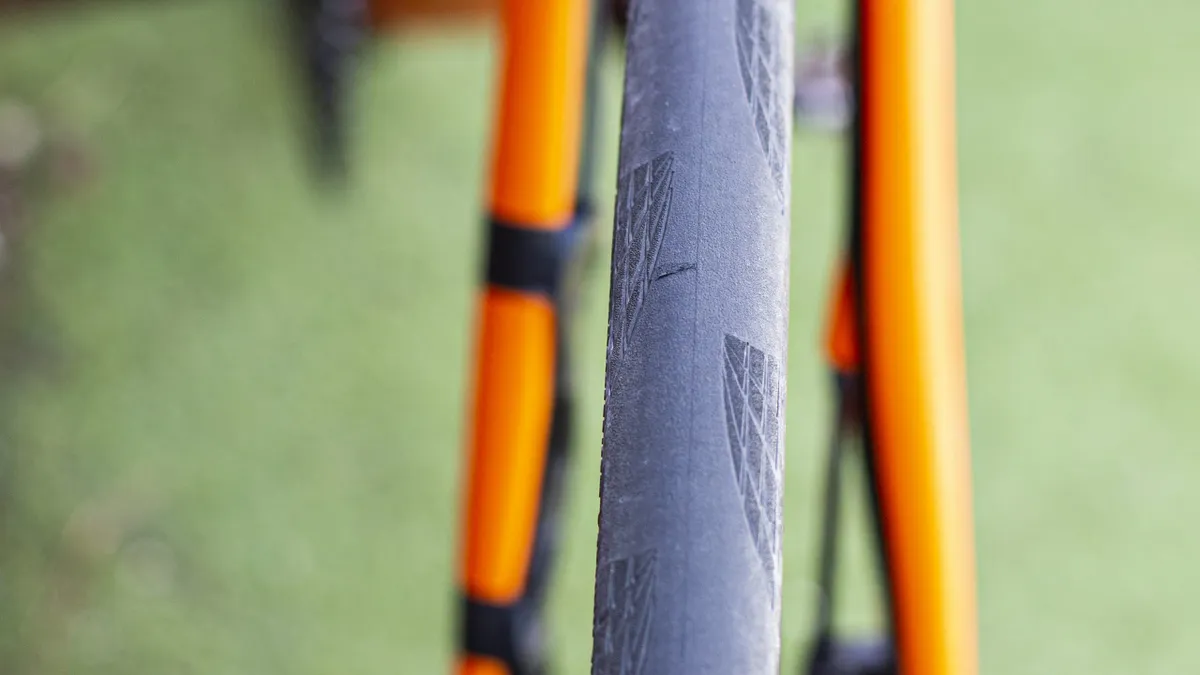
The Continentals are known to be some of the best performing tyres on the market and I think they balance grip and speed very well. Because the Cannondale is such a fun bike to throw around a corner, these tyres are a great match for it.
Should I fancy pushing the Synapse further, away from the road, the tubeless version is also available in a 32mm.
In my initial review (below), I mentioned the Shimano brake levers felt a little unnerving when descending on the hoods.
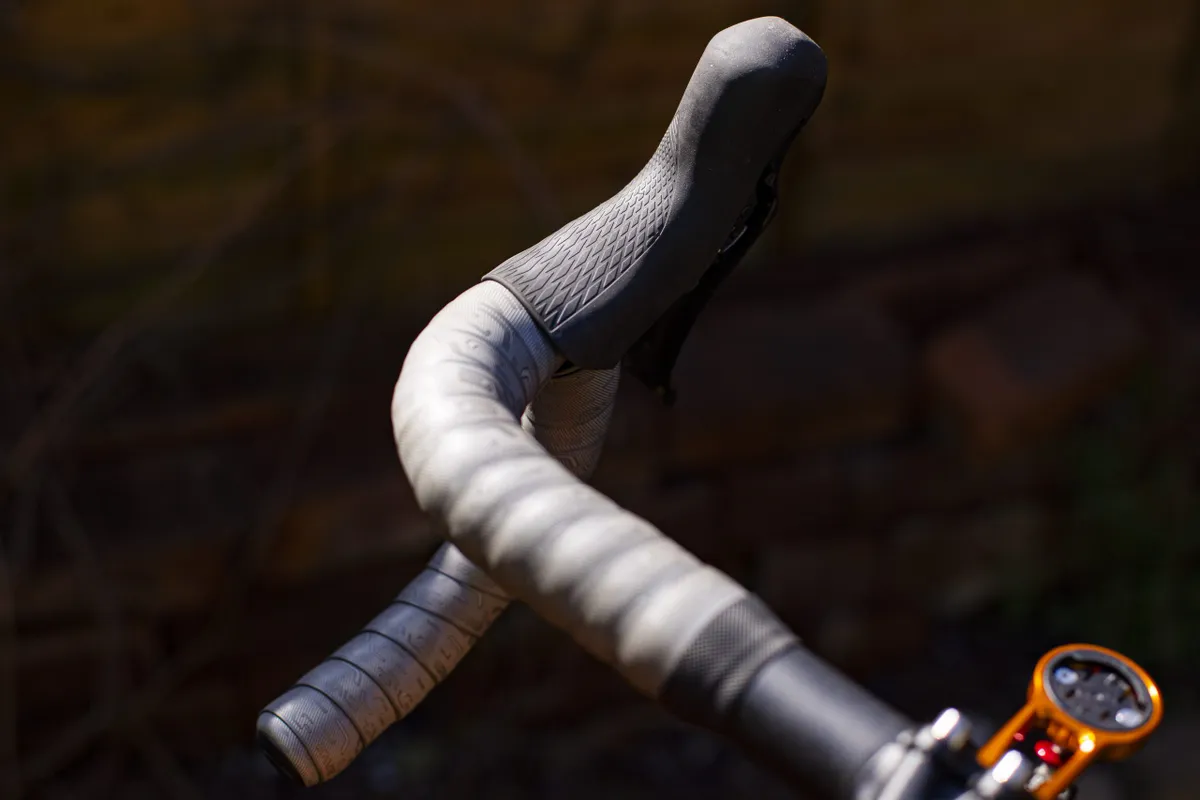
After a few months of riding I feel much more poised, getting used to how the levers move, and with the Ultegra brakes being properly powerful, my confidence has returned.
Unfortunately, I haven’t really been able to test out the endurance abilities of this bike, but it continues to be seriously fun to ride.
At the time of writing, I intend to keep riding regularly not only to help with my wellbeing but also the rehabilitation of my knee, which I'm hoping will get better and stronger as the year progresses.
The original story continues below.
Cannondale Synapse Disc Ultegra specifications and details
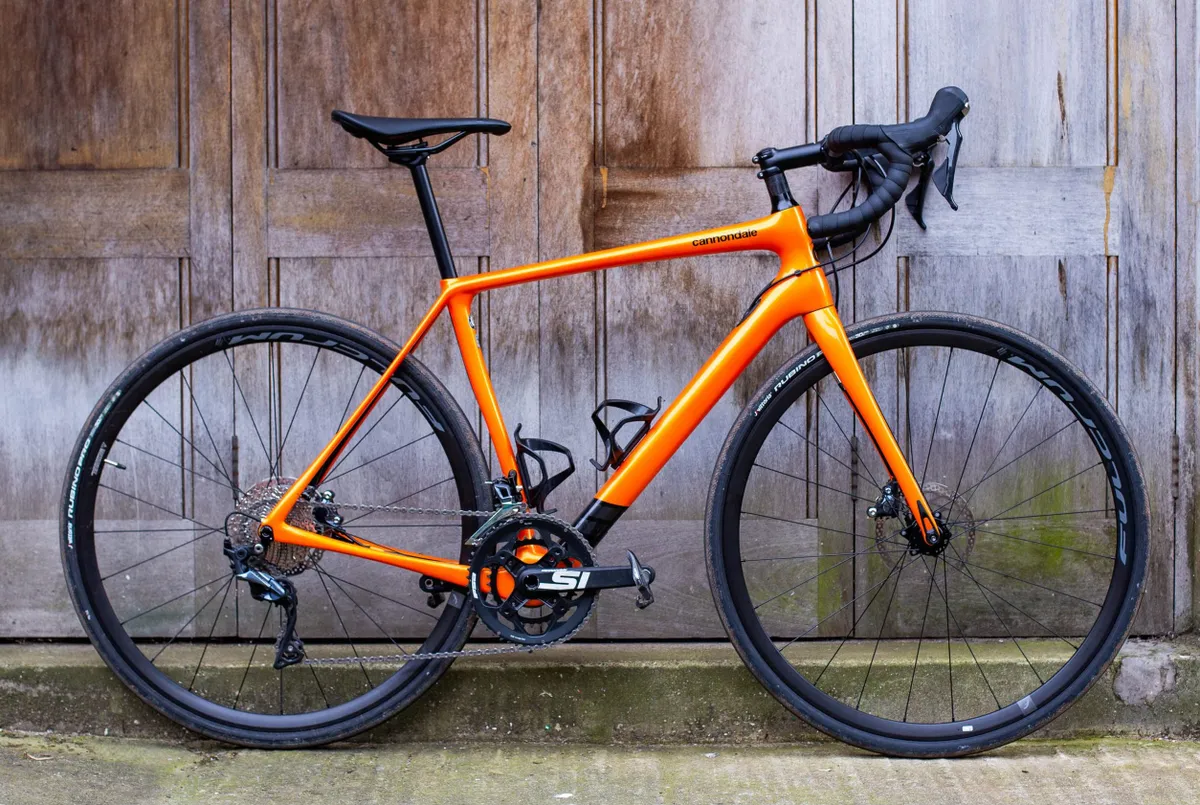
My 54cm Carbon Ultegra model is painted in the blazingly bright orange “crush” colour, but it’s available in black if you want something more inconspicuous.
There are many different spec levels to choose from but this mid-range Ultegra model weighs in at 8.89kg without pedals.
The frame and fork use BallisTec in their carbon layup process, supposedly taken from military ballistic armour, which is claimed to create a super-tough material.
The frame features Cannondale's SAVE PLUS technology, which it says creates vertical compliance for comfort without sacrificing lateral and torsional stiffness for speed and efficiency. This is most noticeable in the helix-shaped seatstays that bend and compress under load.
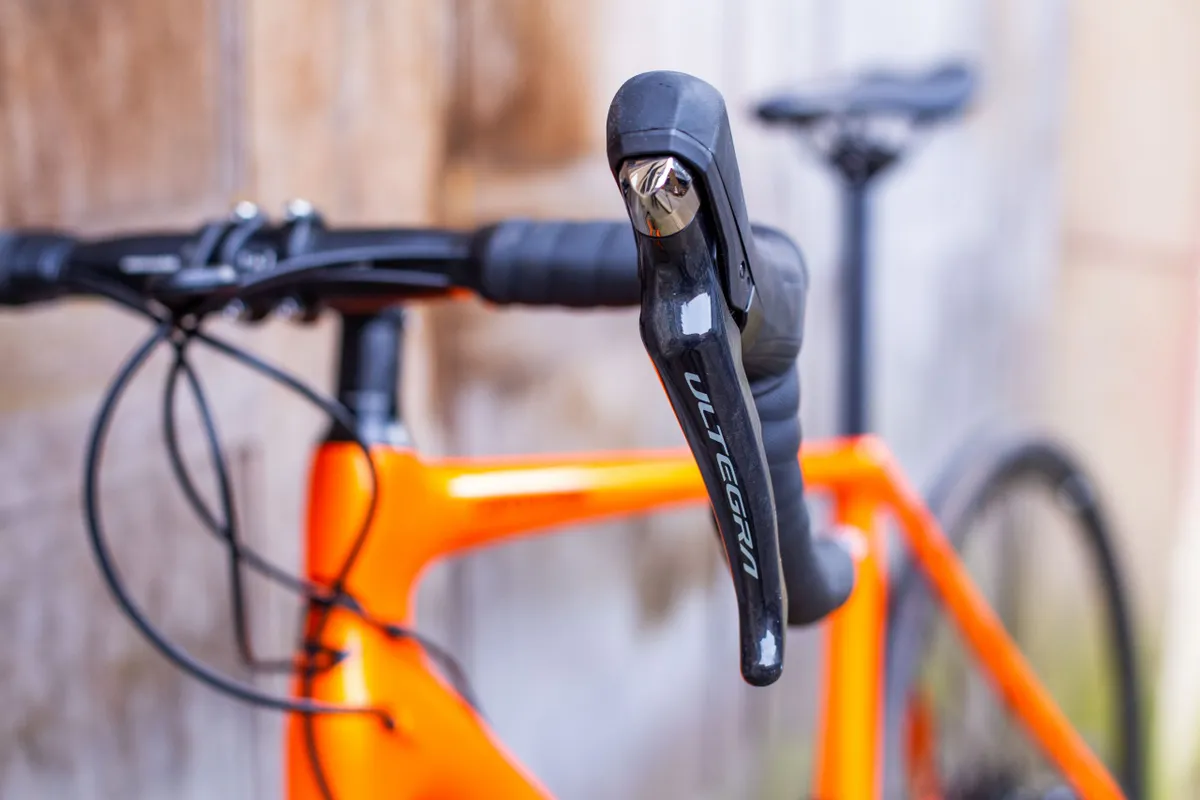
The drivetrain is mostly made up of Ultegra parts, including the front and rear derailleur, and the hydraulic brakes and the levers.
The 11-34t cassette is Shimano’s 105 version, however – presumably to save some money.
Since the frame is based around Cannondale’s own BB30a bottom bracket platform, it's specced with a Cannondale 1 crankset with 50/34-tooth FSA chainrings.
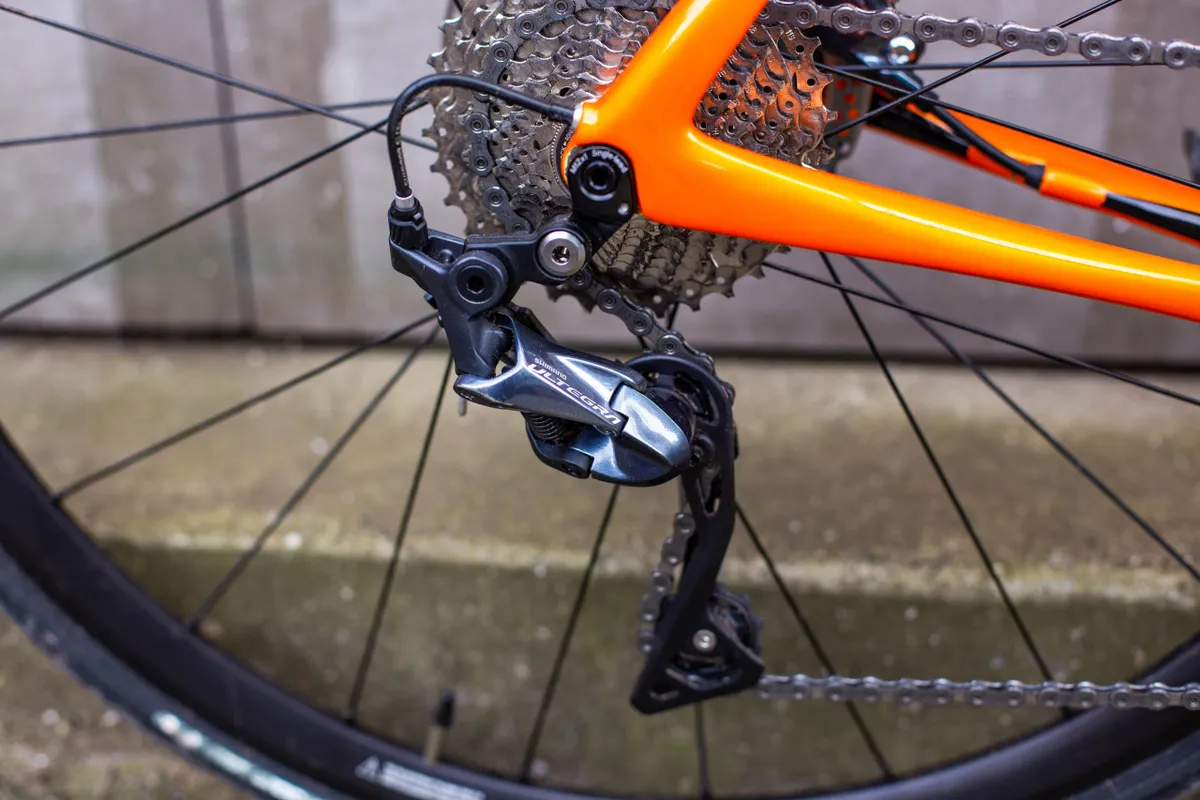
The seatpost, stem and handlebar are all from the Cannondale Three range, and the seatpost measures 25.4mm in diameter, matching that of higher-end carbon models.
There's a Fabric Scoop Shallow Sport saddle with steel rails and nice, chunky 3.5mm Cannondale Grip bar tape with gel to round off the contact points.
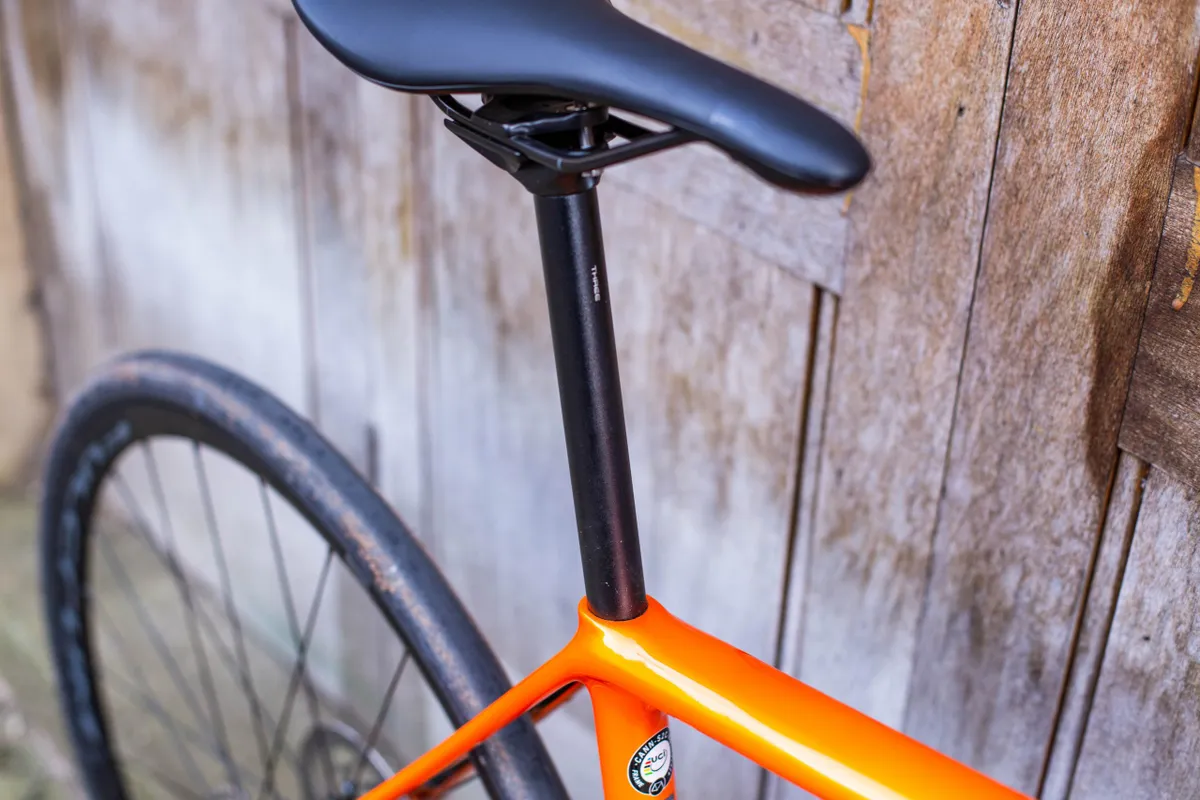
Equipped with Fulcrum Racing 600DB wheels with Centerlock hubs and 12mm quick release thru-axles both front and rear, the rims are tubeless compatible, although the Vittoria Rubino Pro 30mm tyres are not. They do incorporate graphene in their triple compound however, so that's a bonus.
Cannondale Synapse Disc Ultegra geometry (size 54cm)
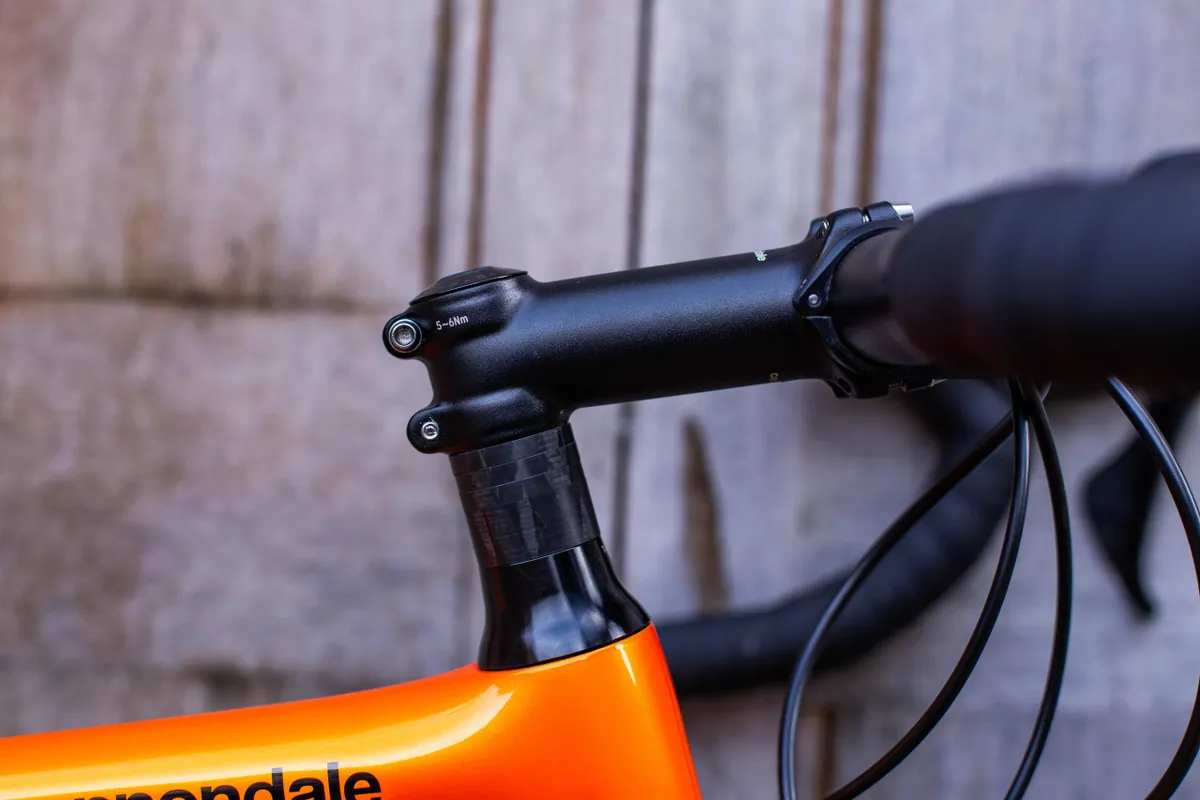
Cannondale's claims of the Synapse being a true endurance-focused bike are reflected in its geometry.
It has a tall 570mm stack height, giving a classic upright position – Cannondale’s gravel bike, the Topstone, has a similar measurement of 579mm – which suggests the Synapse could make a fun gravel bike, too.
At 410mm, the chainstays are relatively short, which should give the bike snappy handling, especially in the corners. It will mean it's perhaps not as planted and stable at higher speeds or when descending on gravel, though.
A bottom bracket height of 272mm isn’t radical but should help get a relatively low centre of gravity for controlled cornering. For comparison, the Topstone Carbon is 280mm and the Cannondale SuperSix EVO is 271mm on a 54cm frame size.
- Head angle: 71.7 degrees
- Seat angle: 73.9 degrees
- Chainstay: 410mm
- Seat tube: 480mm
- Top tube: 547mm
- Head tube: 161mm
- Bottom bracket height: 272mm
- Wheelbase: 1,008mm
- Stack: 570mm
- Reach: 382mm
Why did I choose this bike?
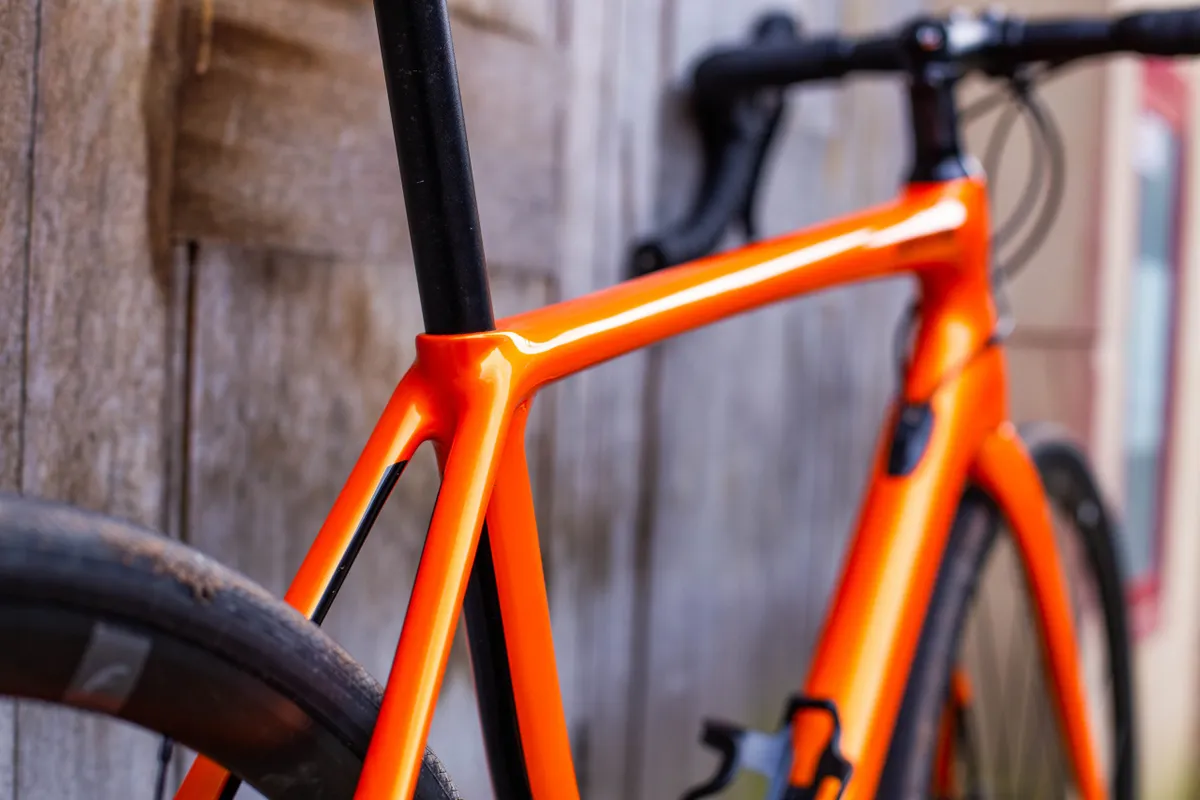
The Cannondale Synapse is not designed for sprint finishes, nor is it a bike built for pure climbing. What it claims to do best is provide a comfortable place to pedal all day and all night, if that’s your jam, and not be confined to just tarmac yet still be agile and able to handle speed.
As a rider that enjoys riding longer distances, and is never going to be finishing in the top 10 in a hill climb or road race, I appreciate these qualities. Choosing the Synapse to ride over the coming year seemed like a sensible option and I'm interested to see if the bump-smoothing technology on the bike will give me the edge after multiple hours riding.
Thanks to my fortunate position as a videographer on BikeRadar's YouTube channel, this is the first time I'm going to 'own' a road-specific bike for a longer period of time.
In the past, I've ridden cyclocross and gravel bikes for drop-bar riding, so I’m eager to find out how different the Synapse will feel compared to a rigid gravel bike such as the Lauf Anywhere, which was my long-term steed for 2019.
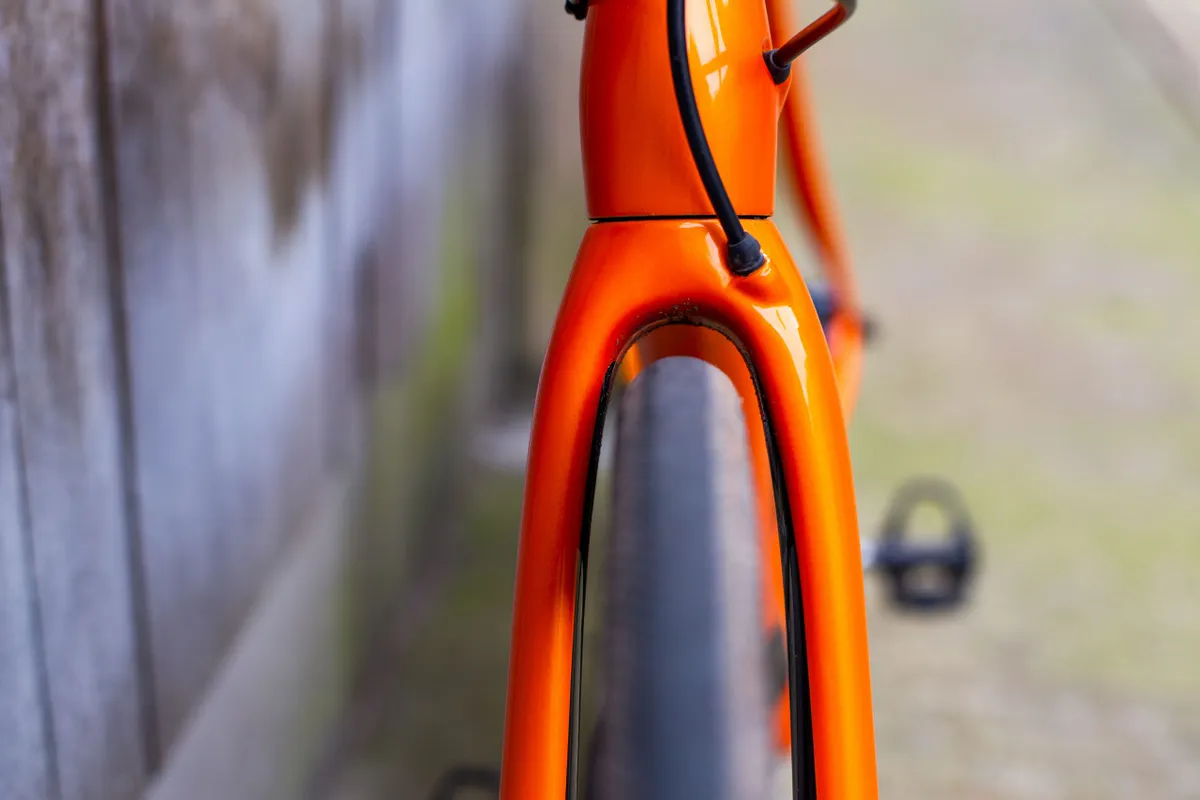
Certain features on the Synapse, such as clearance for 32mm tyres, aren’t a far cry from the adventure style bikes I have ridden in the past and I'm curious to see how it will blend its obvious road intentions with its ability to ride off-road.
If it lives up to the claims of taking on “wilder” riding then this could actually be a very capable and quick bike.
Cannondale Synapse Disc Ultegra initial setup
At 177cm tall, I opted for the 54cm, as instructed by Cannondale.
To get the bike set up initially, there were no proprietary fittings to worry about.
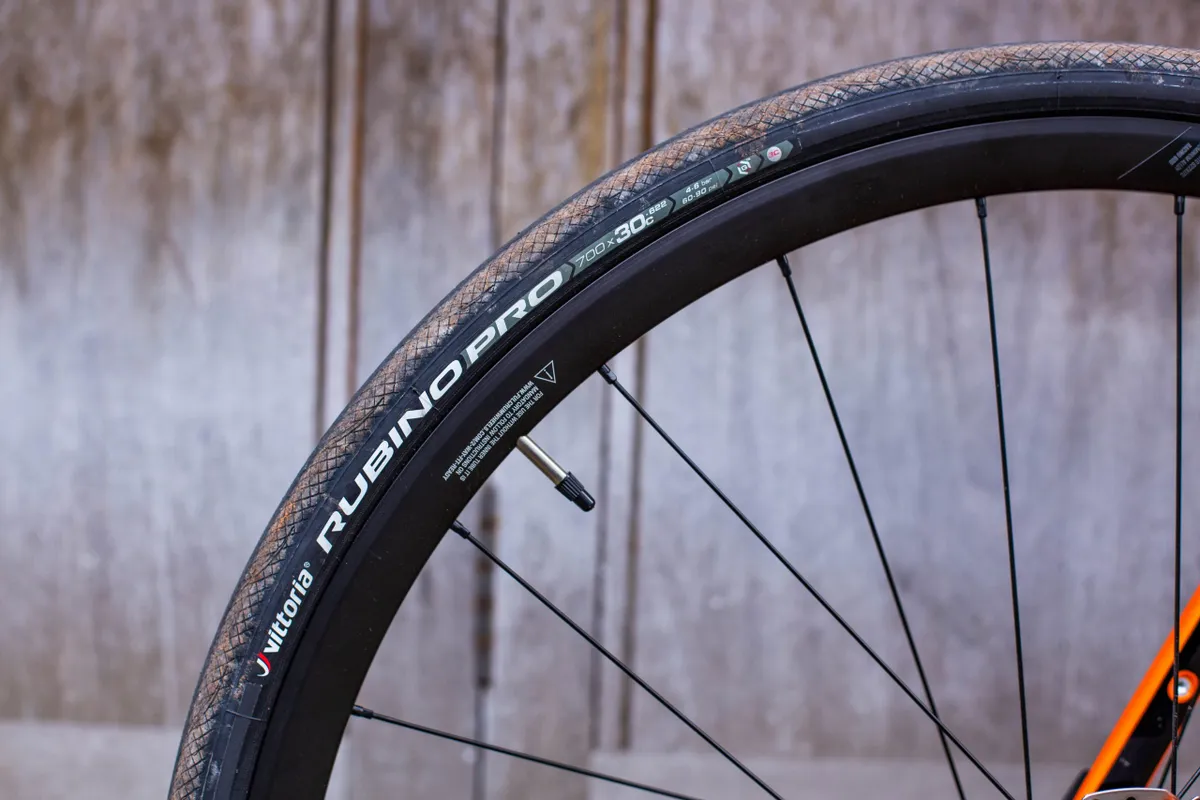
I adjusted the brake lever reach so that it was closer to the bars and pumped the Vittoria Rubino Pro tyres to 55psi, a relatively low pressure given their 30mm width.
However, they aren’t tubeless, so taking care to avoid potholes is still important.
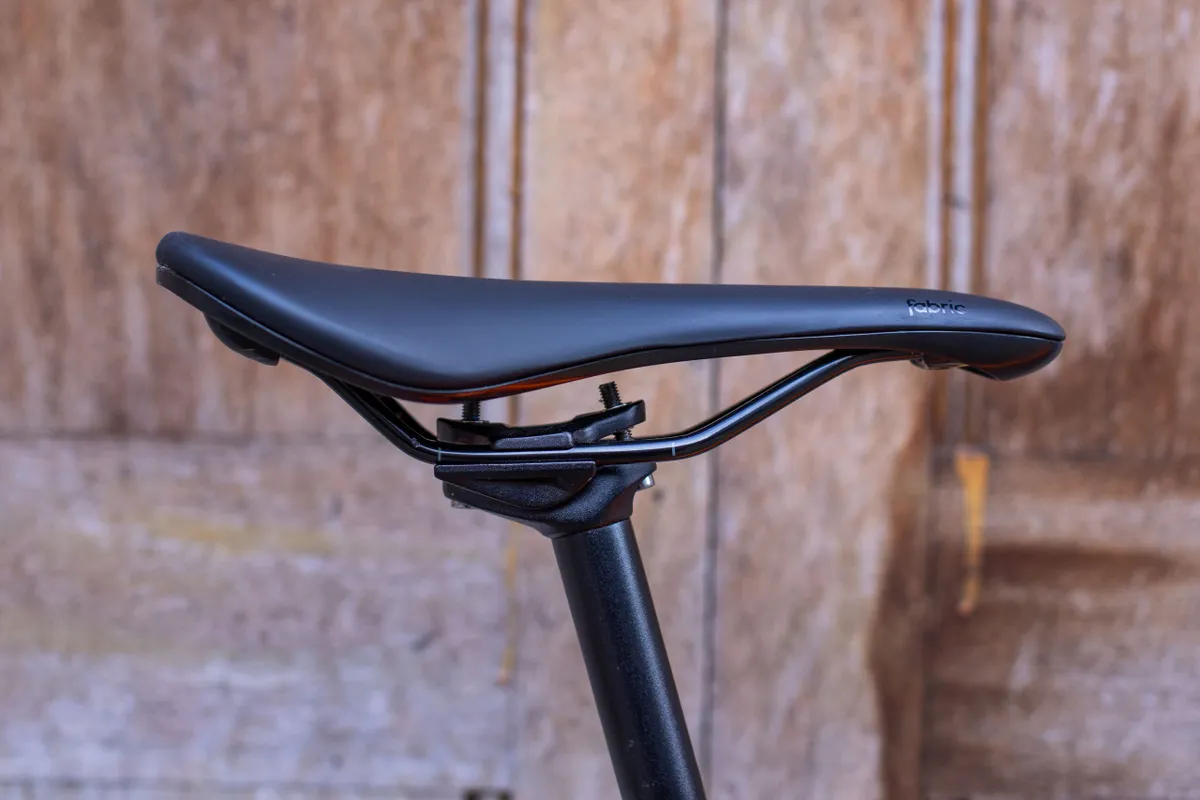
The Fabric Scoop saddle is relatively long, especially compared to the Specialized Power saddle I have ridden in the past.
I moved it rearward in the rails after the first ride because I felt a little too forward of the pedals, and lowered the seatpost slightly to compensate for this.
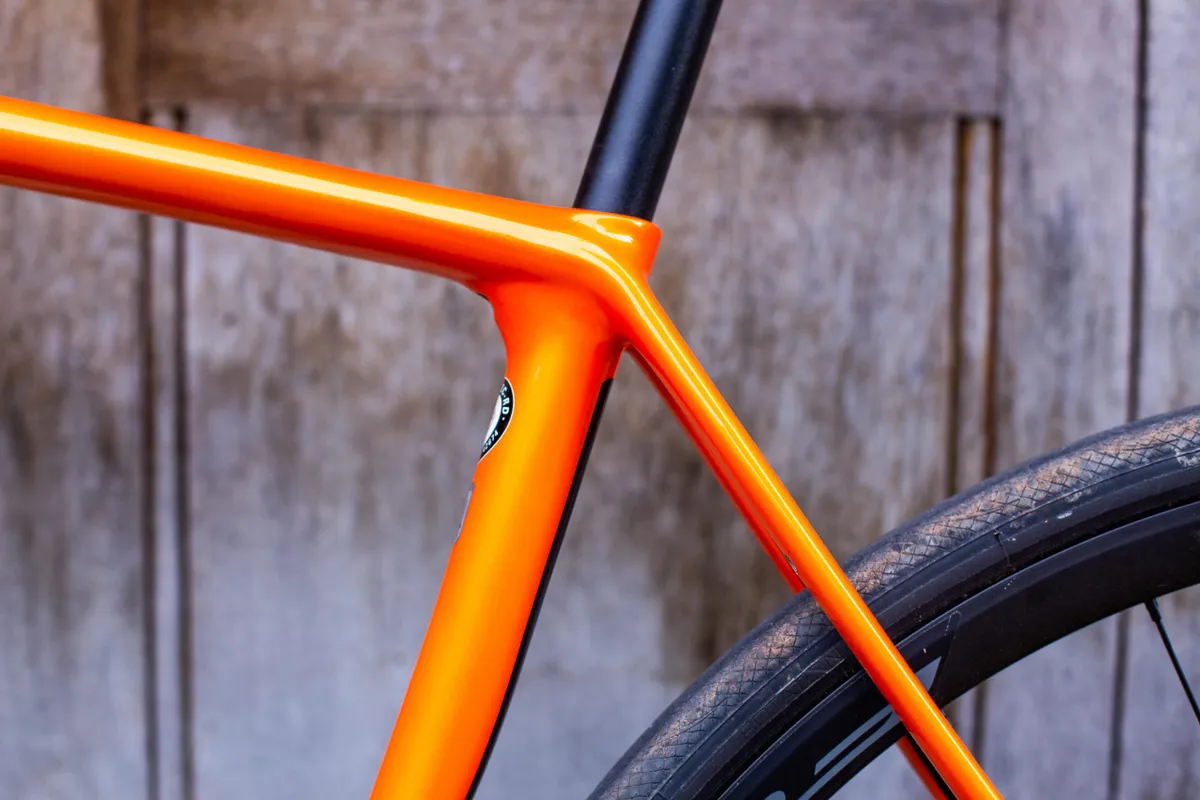
The seatpost clamp is hidden underneath the top tube and sits quite deep into the frame, which means some short Allen keys might struggle to reach the bolt.
Cannondale Synapse Disc Ultegra ride impressions
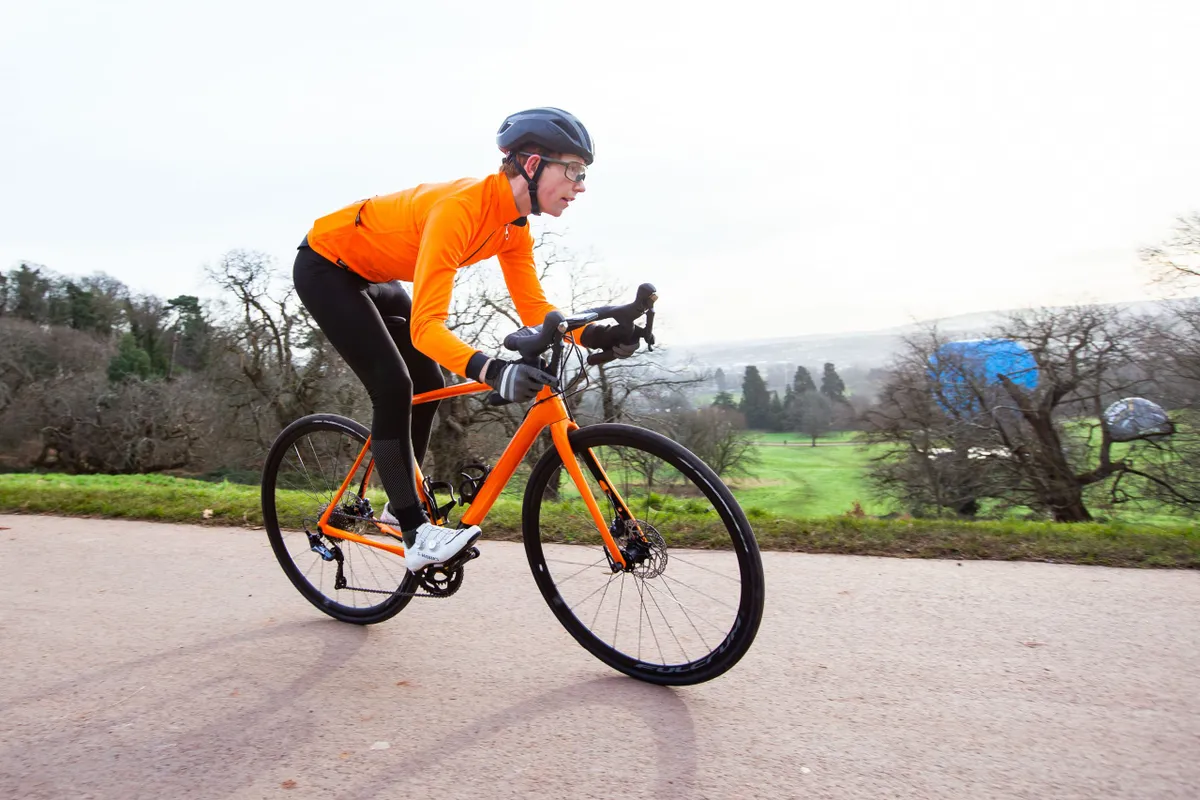
On the first ride, I instantly noticed the tall stack height and super-smooth feel over cobbles and imperfections in the road. It was also incredibly quiet both in terms of freehub noise and general chatter.
It felt very responsive when cornering. Tight bends are enjoyable and, on my first ride, I found myself turning a little sharper than I was expecting.
A few corners later, I quickly got used to the feeling, which, together with the frame’s compliance, makes for a fun yet very smooth riding experience.
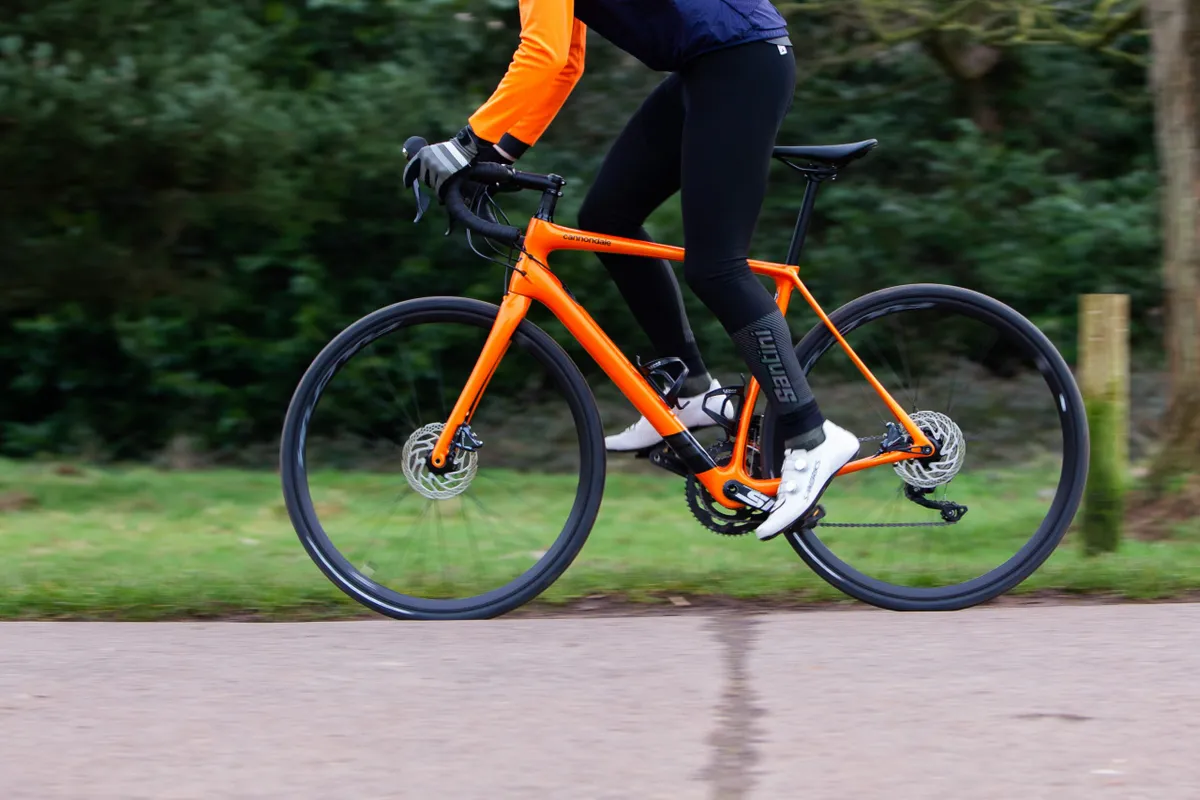
I noticed right away that the tubed Vittoria Rubino Pro tyres held the bike back a little and I feel the ride would be enhanced with the ability to run lower pressures afforded by tubeless setups.
But I did feel at home pretty quickly when descending, attributing this to the frame's road-smoothing SAVE technology.
DoubleTap habits die hard
I found the movement of the Shimano Ultegra brake levers slightly unnerving at first.
Shimano levers require an inward shift stroke to change gear, and being used to SRAM's DoubleTap levers I've developed a habit of using the rigidity of the lever for stability, so when braking with Shimano I find the lever pushes to the side slightly, which doesn’t provide me with confidence when descending.
Hopefully I can get over this!
The Ultegra hydraulic disc brakes do a superb job, though, and straight away felt very dependable, allowing me to brake later than I usually would.
I haven’t noticed any excessive noise from them yet, although I've not ridden them in the city, which, when it’s raining, seems to be a sure way to contaminate the pads and rotors.
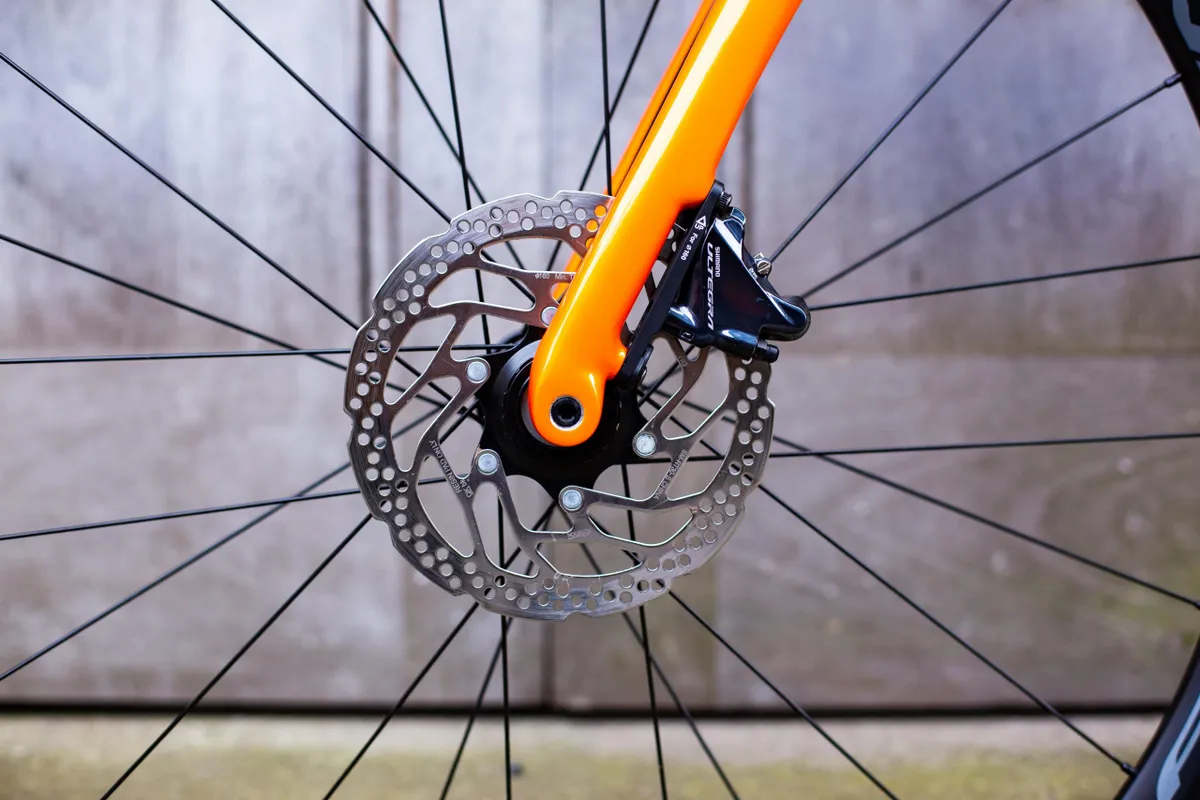
After a couple of initial rides to help setup the bike, I felt a small amount of play from the front end.
This felt very much like the headset was loose, but after a bit of tinkering I realised the movement was actually coming from the brake rotor.
The Shimano Centerlock RT30 rotors were torqued to the recommended amount, but, despite this, with the front brake and some force applied forwards and backwards, the rotor was able to move a small amount.
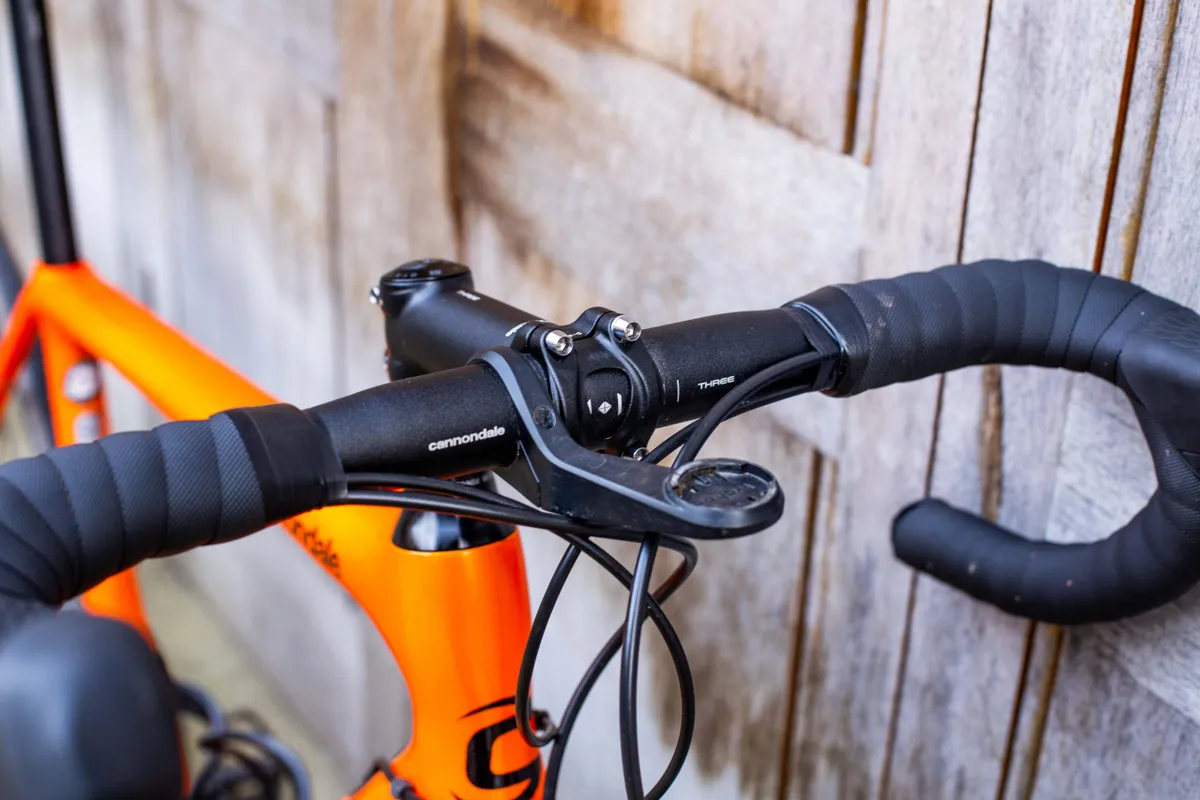
The 3.5mm Cannondale Grip bar tape with gel is a great addition to the bike and not only adds a lot of comfort but feels nice and grippy, too. This is an important component of an endurance bike and an area that could have been overlooked.
BB30 problems? Not yet!
Climbing on the Synapse is helped by the oversized BB30a bottom bracket. The original form of this bottom bracket was adopted by Cannondale back in 2000, and adding stiffness to the frame is its biggest plus.
When climbing out the saddle I really felt the bike transferring my power efficiently and, unsurprisingly, it feels wonderfully smooth.

I've seen reports of BB30a bottom brackets developing noises over time, so it'll be interesting to see how I get on.
It's a looker
I really like how the Synapse looks and the frame's lines remind me of sinews, with a kind of refined, muscular look that isn't overly aggressive.
I particularly like the split in the seat tube as it meets the bottom bracket shell.
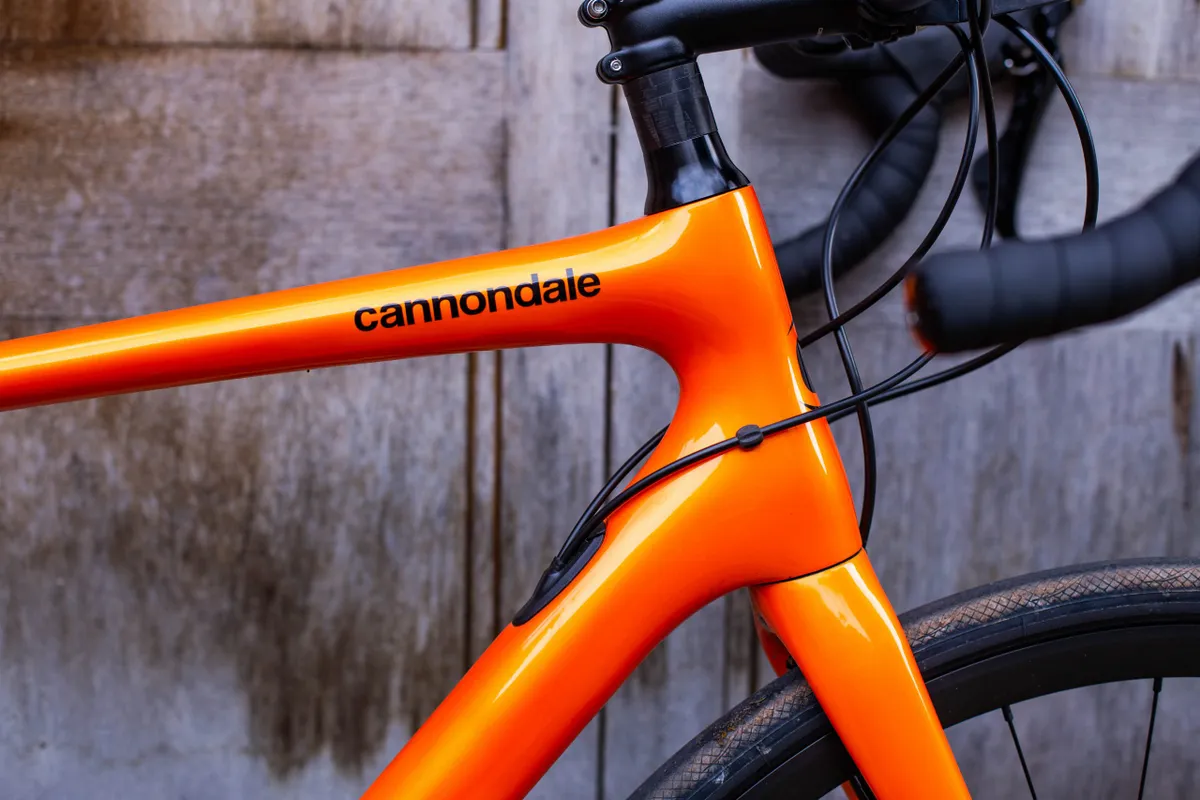
Although it does have internal cable routing, the brake and gear cables look messy at the front of the bike. This does spoil the otherwise handsome appearance and, although not necessarily important to some, probably doesn't enhance its aerodynamic properties.
I’ve also found it difficult to mount a compact handlebar bag since the outer cables get in the way.
At just shy of 9kg and with a price tag of £2,700 some might expect it to weigh less. However, it is important to remember that this is a bike designed for going the distance in relative comfort, rather than being optimised for short, full-on efforts.
It hasn’t been designed with aerodynamics at front of mind, either, but since ultra-distance racing is taking off around the world could be the next step for the Synapse range.
If you're racing thousands of kilometres, an aero advantage seems like an obvious consideration, but for me, comfort, conditioning and rehabilitation of my knee are all more important than all-out speed this year.
Cannondale Synapse Disc Ultegra upgrades

Before I had taken the Synapse for a proper ride I installed two Lezyne Flow side-loading bottle cages.
These have to be my favourite bottle cages because I can use a top-tube style frame pack and still get bottles in and out. They are super-light but tough and, despite the side loading design, I have never lost a bottle, even when gravel racing.
The areas where I can see meaningful upgrades made are the wheels and tyres.
The Fulcrum Racing 600DB wheels aren’t bad; they are tubeless-ready, have sealed cartridge bearings and durable brass nipples. However, the internal width of 17mm isn’t very wide for a bike that comes with 30mm tyres as standard and, at 1,690g for the pair, they aren’t particularly light for a bike that costs £2,700.
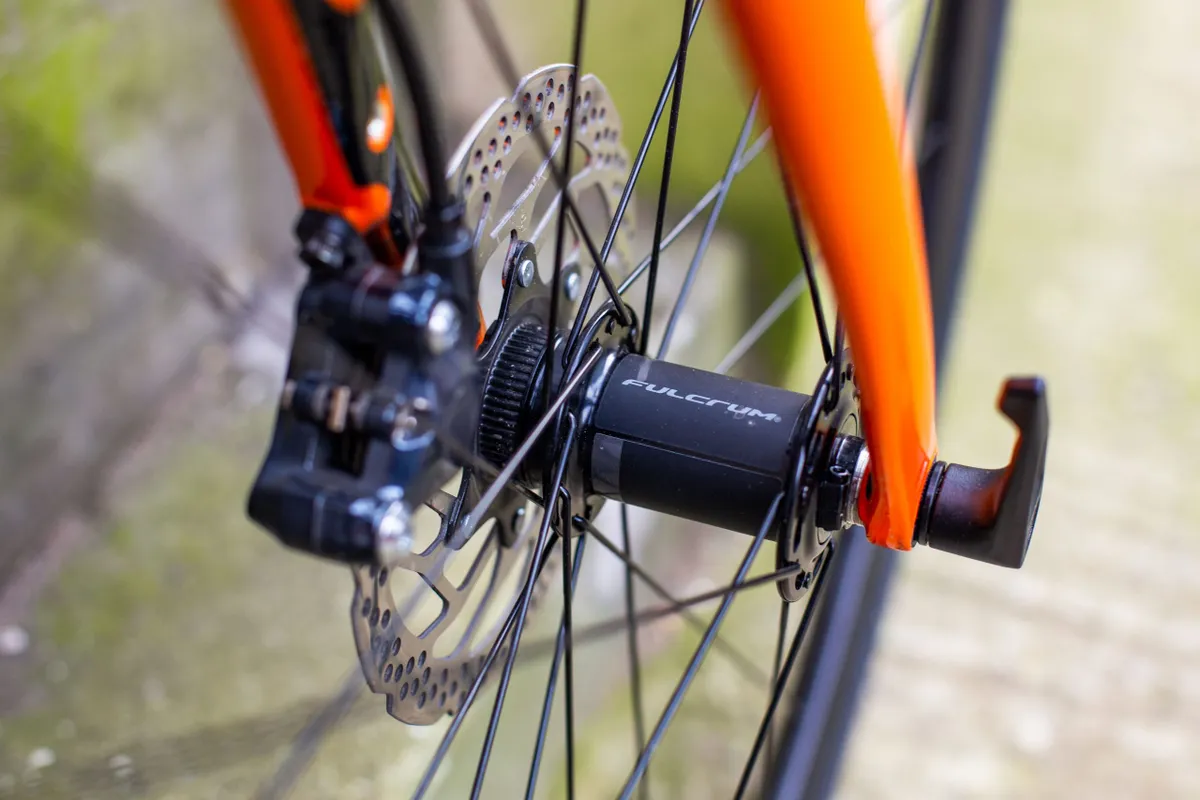
Upgrading the wheels to something with a wider profile and lower weight would be an easy performance win. I'd be interested in some deeper section aero rims too for long-distance rides because there could be significant aerodynamic gains to be had.
At 30mm, the Rubino Pro tyres are a good width for taking the edge off poor road surfaces, but since they aren't tubeless compatible, the performance gains of a modern wide tyre cannot be fully taken advantage.
I'd like to try a fast tubeless tyre like the Schwalbe Pro One or the Continental GP5000 in 28mm or 32mm widths. This would allow me to run lower pressures and also reduce the likelihood of punctures.
During winter, I was using the Hunt Superdura Dynamo Disc wheel to power an Exposure Revo front light and Redeye rear light. I used this setup for the 2,000km Transatlantic Way ride I attempted in 2019. I was absolutely converted to the dynamo. Having guaranteed lighting not only increases safety on the road but also means I have a bike that will always be ready for a ride no matter what the conditions outside.
The SON Delux hub is claimed to have 20 per cent less resistance than its standard dynamo hubs and, at around 400g, the weight penalty is virtually non-existent when compared to a non-dynamo setup requiring batteries for lights.
The Superdura rim has a super-wide 20mm internal width meaning tyres have a larger surface area for more grip and in some cases more speed. I believe this would be the perfect match for the Synapse and I'm really looking forward to getting it set up.
The Fabric Scoop saddle has generally good reviews from riders, so I plan to stick with it for longer rides to see how it feels. Saddles can take some time to get a feel for, and even though I am tempted to put on my Specialized Mimic saddle, I will hold off for now.
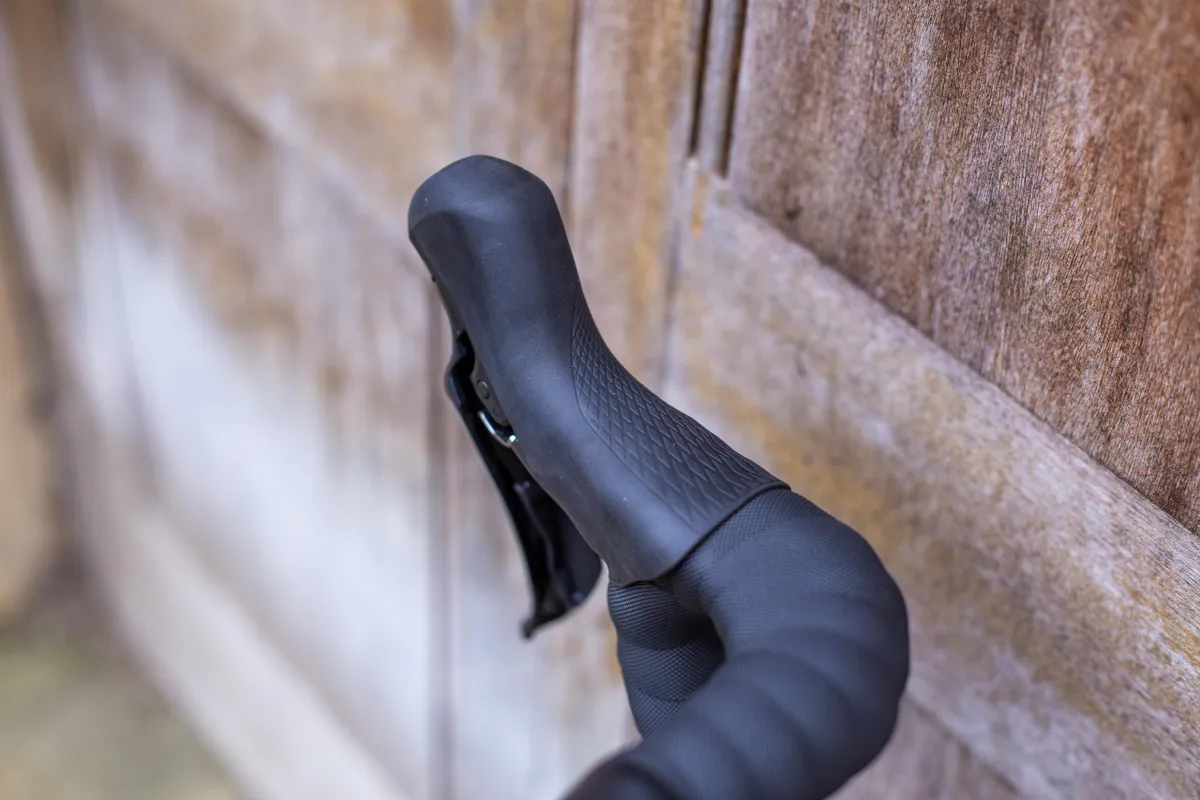
The Cannondale Three bar and stem are basic but functional and non-offensive to look at, but I have some Fizik Cyrano 00 bars kindly donated by BikeRadar's Joe Norledge that I'm planning to fit. They are extremely light at 180g and would give the bike a rather classy finish.
I also have some fairly controversial grey Enve bar tape, which I plan to wrap them in.
BikeRadar's 2020 long-term test bikes
At the start of the year, every member of the BikeRadar team selects a long-term test bike to ride over the course of the following 12 months. Some choose a bike from their favoured discipline and ride it hard for a year, others opt for a bike that takes them outside of their comfort zone.
Our long-term test gives us the opportunity to truly get to grips with these machines, so we can tell you how they perform through different seasons and on ever-changing terrain.
We also use them as test beds for the latest kit, chopping and changing parts to see what really makes the difference – and help you decide which upgrades are worth spending your money on.
To see all of the BikeRadar team's 2020 bikes – and stay up-to-date with the latest developments – visit our long-term review hub.
Product
| Brand | Cannondale |
| Price | A$4499.00, €2999.00, £2700.00, $3300.00 |
| br_whatWeTested | Cannondale Synapse Disc Ultegra |
| Weight | 8.89kg |
Features
| Fork | BallisTec Carbon, SAVE, integrated crown race, 12x100mm thru-axle, internal routing, size-specific design - 44-48: 1 1/8" steerer, 60mm rake 51-54: 1-1/8" - 1-1/4" tapered steerer, 55mm rake 56-61: 1-1/8" - 1-3/8" tapered steerer, 45mm rake |
| Stem | Cannondale 3, 6061 alloy, 7-degree |
| Chain | Shimano HG601, 11-speed |
| Frame | BallisTec Carbon, Di2 ready, SAVE, BB30a, flat mount, 12mm thru axle, internal cable routing, removable fender bridge |
| Tyres | Vittoria Rubino Pro Bright Black, 700x30c |
| Brakes | Shimano Ultegra hydro disc |
| Cranks | Cannondale 1, BB30a, FSA rings, 50/34 |
| Saddle | Fabric Scoop Shallow Sport, steel rails |
| Wheels | Fulcrum Racing 600 DB, Alloy clincher, 26mm deep rims on Fulcrum Racing 600 DB hubs |
| Headset | Synapse, 1-1/4" lower bearing, 25mm top cap |
| Shifter | Shimano Ultegra hydro disc, 2x11 |
| Cassette | Shimano 105, 11-34, 11-speed |
| Seatpost | Cannondale 3, 6061 Alloy, 25.4 x 350mm |
| Grips/tape | Cannondale Grip Bar Tape w/Gel, 3.5mm |
| Handlebar | Cannondale 3, 6061 alloy, Compact |
| Bottom bracket | Cannondale Alloy PressFit30 |
| Available sizes | 48cm, 51cm, 54cm, 56cm, 58cm, 61cm |
| Rear derailleur | Shimano Ultegra GS |
| Front derailleur | Shimano Ultegra, braze-on |
